History > EXAM > HIS 104 All Challenges History Questions And Answers( Download To Score An A) (All)
HIS 104 All Challenges History Questions And Answers( Download To Score An A)
Document Content and Description Below
Unit 1 Challenge 1 1. Which of the following statements is true? a.) Historians have a responsibility to merge their own experiences into historical narratives. b.) The writing of histor... y is influenced by the cultural environment in which it is written. c.) History is best determined through the lenses of politics and economics. d.) Historical interpretations of past events rarely change over time. 2. Consider the following research question and choose the primary source that is best suited to answer it. "What were the long-term consequences of Japanese internment camps in the United States during World War II?" a.) A high school history textbook published in 1990 b.) An interview in 2001 with a Japanese American who was confined to a camp c.) A national newscast from 1942 d.) A documentary about World War II produced by a historian 3. As part of her research on the American Revolution, Bea reads a book about forms of public protest in the 18th century colonies. Which of the following is most likely a lens she is exploring? a.) Race b.) Ethics c.) Politics d.) Economics Which native civilization lived in permanent settlements made up of apartmentlike complexes of stone and mud? a.) The Pueblo b.) The Aztec c.) The Olmec d.) The Hopewell Which of the following historians is collecting oral history? a.) Hajit makes detailed drawings of prehistoric images found on boulders in Minnesota. b.) Hector analyzes one of the first maps made by European explorers. c.) Hope attempts to translate symbols on a pot that she believes were a form of writing. d.) Helen interviews contemporary Native Americans about their cultural traditions. Which statement is most representative of the French approach toward native peoples in the Americas? a.) "Your territory belongs to us by decree of the Catholic Church." b.) "The natives will submit to the absolute authority of the Crown." c.) "Gift exchanges with natives will forge alliances and establish trade relationships." d.) "The natives, although poor, show ingenuity and will welcome friendship with a superior civilization." Which of the following events led to increased maritime exploration in the 15th century? a.) The Crusades of the 11th, 12th and 13th centuries b.) Discoveries by the Vikings c.) The invention of the printing press d.) Competition between Catholics and Protestants European traders discovered that they could sell chocolate from the New World back home in Europe. Which of the following concepts does this statement best exemplify? a.) Globalization b.) Colonization c.) Commodification Which of the following statements is true about slavery prior to the Atlantic slave trade? a.) It could involve one person bonding himself to another so as to work off a debt. b.) Slaves were almost always considered to be the property of their masters. c.) It was largely an issue of race, as only people with darker skin could become slaves. d.) A person's religion had no impact on whether he or she could be enslaved. In 1540, Francisco Vásquez de Coronado set out to find the rumored golden city of Quivira. What came of his expedition? a.) Despite a two-year expedition that got as far north as modern-day Kansas, Coronado never found Quivira. b.) Quivira was discovered near present-day Albuquerque, stripped of its wealth and ultimately abandoned. c.) Quivira was found in modern-day Oklahoma, but its wealth had been greatly exaggerated in the rumors. d.) Coronado's expedition ended prematurely after a particularly brutal winter in the Rocky Mountains. What was a significant factor in the demise of Dutch settlements in the Americas? a.) Internal struggles back in Holland b.) Too few European settlers c.) Territorial disputes with France d.) Conflict with native peoples Interactions between Native Americans and Europeans led to the commercialization of traditional beaver-hunting practices. Which of the following factors played the biggest role in that change? a.) Europeans introduced the concept of private ownership of hunting lands. b.) Europeans introduced capitalism and ideas about success through hard work. c.) Europeans were willing to give Native Americans muskets in exchange for beaver pelts. d.) Europeans brought new animals that made it easier to hunt for beavers. Which of the following statements is characteristic of Martin Luther's position in 1517? a.) "I declare myself to be the head of the Catholic Church in my country." b.) "Individual monarchs have too much power." c.) "Reading scripture prepares people to receive God's grace if they are among the elect." d.) "The practice of selling indulgences is corrupt and has to stop." What role did European exports play in the Triangular Trade? a.) Guns and gunpowder from Europe were exchanged for sugar in Africa. b.) Slaves would be brought from Europe to the Americas in exchange for textiles, rum and other goods. c.) Rum was used to lure Africans into the voyage to America, where they would then be forced into slavery. d.) Manufactured goods were used to buy African slaves from other Africans who captured them. Which statement is most representative of the French approach toward native peoples in the Americas? a.) "Your territory belongs to us by decree of the Catholic Church." b.) "The natives will submit to the absolute authority of the Crown." c.) "Gift exchanges with natives will forge alliances and establish trade relationships." d.) "The natives, although poor, show ingenuity and will welcome friendship with a superior civilization." "Unlike other colonists, these men and women were motivated by religion and a desire to create a successful community." Which English colony is most likely being described here? a.) Massachusetts Bay b.) Roanoke c.) Jamestown d.) Virginia Which factor led to the implementation of the Headright System? a.) Abundant land and the desire to attract more migrants b.) The desire to equalize opportunity for Englishmen c.) The racialization of slavery in the New World d.) Landowners abusing the system of indentured servitude Which factor led to the creation of a maritime-based economy in the northern colonies? a.) Agricultural surpluses that could be sold in foreign markets b.) Need for slave labor in the northern colonies c.) Religious intolerance in the northern colonies d.) Settlers with diverse backgrounds and tastes in the northern colonies Which of the following societal changes occurred when New Netherlands became New York? a.) Married women could no longer use their own name to do business. b.) Slavery, which had been condemned by the Dutch, was introduced. c.) Colonists of Dutch descent were forcibly exiled back to Europe. d.) A system of patronage was implemented to distribute land. Which of the following was a source of tension between English colonists and Native Americans? a.) Colonists were envious of Native Americans' agricultural know-how. b.) Native Americans took pity on the colonists for their lack of preparedness. c.) Colonists viewed Native Americans as weak and easily conquerable. d.) The growing population in the colonies led to colonists claiming more territory. Consider the excerpt from Robert Johnson's "Nova Britannia" and the possible bias it represents. Which of the following statements most likely identifies Johnson's purpose in writing? a.)Johnson's purpose was to attract people to invest in the Virginia Company and settle in Jamestown. b.)Johnson's purpose was to give investors a carefully constructed idea of how the Virginia Company operated internally. c.)Johnson's purpose was to provide an accurate description of Jamestown for future historians to study. d.)Johnson's purpose was to instruct settlers on how to thrive in Virginia and profit from its resources. Which of the following statements describes the relationship between the English and the Native Americans in the first half of the 18th century? a.) At times the Native Americans traded and even made alliances with the English, but these often led to devastating conflicts. b.) Most English settlers acknowledged Native American rights to the land, but the colonial government refused to acknowledge any such rights. c.) The English suspected that all Native Americans supported the Spanish, so they were reluctant to engage in trade or military alliances. d.) The English settlers saw the Native Americans only as obstacles to be removed. They refused to form alliances with native peoples, even when England was at war with the Spanish or French. Which of the following actions is an example of salutary neglect? a.) A royal governor exercises greater control in local politics than the colonial assembly does. b.) A colonial merchant ships tobacco and cotton grown in the colonies to England. c.) The British parliament exerts greater independence and control over English law. d.) A New England trader routinely smuggles in raw sugar from the West Indies with no penalties. Which of the following was an effect of the Great Awakening? a.) The establishment of new churches like the Baptists and the Methodists b.) Widespread acceptance that all people are saved and none are damned c.) Women were even more excluded from religious meetings and the life of faith d.) Greater toleration of Catholics and other non-Protestants Which of the following statements reflects the ideas proposed by John Locke? a.) "People should have the power to change their government when it fails to protect their natural rights." b.) "The purpose of government is to provide for its citizens' basic needs, like food and education." c.) "Kings have a divine right to rule but also a responsibility to protect the rights of their subjects." d.) "Governments must follow the one true faith to fully protect man's welfare." Which of the following happened as a result of the French and Indian War? a.) Tensions formed between colonists and British soldiers, who had treated them poorly during the war. b.) Spain lost its colonies in Florida, Cuba and the Philippines to the British, who did not lose anything after the war. c.) The colonists formed a bond with the French, who would later help them gain independence from England. d.) France retained control of Canada, but Britain gained France's colonies east of the Mississippi River. The diagram of the British slave ship Brookes most directly illustrates what feature of the Atlantic slave trade? a.)The involvement of Africans in the sale and transport of other enslaved Africans b.)The often violent responses of slave traders if a captive managed to escape their chains c.)The interest among slave traders in maximizing profits and the perception of slaves as commodities d.)The enormous profits reaped by Europeans from the Atlantic slave trade Which of the following statements best reflects the gang system of labor, from a slave's perspective? a.) “This afternoon, some of us met to pick tomatoes and prepare our evening meal.” b.) “My assigned chores finished for the day, I had a refreshing swim in the pond.” c.) “The large size of this plantation has allowed us to grow our families and maintain some traditions.” d.) “The overseer watched us every moment of the day, ensuring that we were doing our jobs.” After the French and Indian War, the British enacted a series of measures that affected the colonies. What was the result of the Currency Act of 1764? a.) It placed all colonial banking under direct control of the monarchy. b.) It banned the use of paper money in trade with Britain. c.) It paid for the administration of a new British province in Canada. d.) It restricted the right to a trial by jury, thereby violating a basic right of all Englishmen. Which of the following is an example of how colonial women protested the Stamp Act? a.) The literate among them wrote appeals to colonial legislatures. b.) Women organized non-importation movements to boycott British goods. c.) Women joined their husbands in large public protests while burning tax collectors' effigies. d.) They published articles in newspapers and pamphlets that circulated the colonies. What was the relationship between the Townshend Acts and the Boston Massacre? a.) The British army occupied Boston after the Townshend Acts to restore order, which increased tension between colonists and British troops. b.) The Sons of Liberty orchestrated a direct attack on British troops that ended in bloodshed. c.) Several colonists were shot by British troops while actively protesting the Townshend Acts. d.) British troops fired on protesters who were preventing other colonists from purchasing boycotted goods. What unique circumstances caused the Boston Tea Party to take place in Boston, and not in another port city? a.) Most British tea was imported through Boston, as southerners avoided warm beverages on account of the climate. b.) The governor of Massachusetts insisted all tea be unloaded and taxed instead of sending it back to England. c.) Similar riots took place in every port city that same night, but the one in Boston was the largest and most costly. d.) The Sons of Liberty had a stronger presence in Boston, which had a smaller port than New York or Charleston. Many colonists believed that England was only justified in taxing commerce between the colonies and the British Empire and that local assemblies had the exclusive right to collect direct taxes on individuals. Which combination does this represent? a.)Internal taxation and actual representation b.)Internal taxation and virtual representation c.)External taxation and virtual representation d.)External taxation and actual representation What was the primary activity of British troops stationed in Boston? a.) To monitor the actions of the First Continental Congress b.) To protect British settlers from colonial militias of minutemen c.) To begin raiding and overthrowing other important cities d.) To seize stockpiles of arms and gunpowder in nearby towns Which of the following statements about loyalists is true? a.) Loyalists tended to draw criticism for their hostile behavior from Patriots, who were better behaved. b.) Most loyalists had been born in Britain and were thus represented in Parliament. c.) Some Loyalists were escaped slaves, who were promised freedom if they supported Britain. d.) Most Loyalists believed the king had absolute power in the colonies. Marquis de Lafayette was an important figure in the Revolutionary War. Select the statement that correctly identifies him. a.) “I realized that to defeat the British in the south, I had to divide my troops, and the strategy worked.” b.) “To sustain the Revolution through the winter months, I launched surprise attacks at Trenton and Princeton.” c.) “I was a French aristocrat and military officer who fought with the Continental Army.” d.) “I commanded the military government in Charleston after our troops forced its surrender.” Which of the following quotations—from documents associated with the American, French and Haitian revolutions—exemplifies the Enlightenment idea of natural equality? a.) “That to secure these rights, Governments are instituted among Men, deriving their just powers from the consent of the governed.” b.) “But as for those, who, intoxicated with foolish pride, interested slaves of a guilty pretension, are blinded so much as to believe themselves the essence of human nature, and assert that they are destined by heaven to be our masters and our tyrants, let them never come near the land of St. Domingo.” c.) “The representatives of the French people, constituted as a National Assembly, and considering that ignorance, neglect, or contempt of the rights of man are the sole causes of public misfortunes and governmental corruption.” d.) “The law is the expression of the general will. All citizens have the right to take part, in person or by their representatives, in its formation.” Judith Sargent Murray wrote, "But from that period what partiality! How is the one exalted, and the other depressed, by the contrary modes of education which are adopted! The one is taught to aspire, and the other is early confined and limited." What kind of inequality is she lamenting? a.) Income inequality b.) Racial inequality c.) Gender inequality d.) Religious inequality 1 How had royal officials in other colonies prevented riots similar to the Boston Tea Party? By requiring merchants to unload their tea and pay taxes before vigilantes could get to it. By forcing merchants to turn back to England before tea could be unloaded and taxed. By paying the required taxes out of their own pockets because of coercion from colonists. By dispatching larger numbers of soldiers to guard their ports and prevent riots. 2 Followers of the Enlightenment in England and its colonies believed that power must be __________ to best protect individual liberty. balanced absolute destroyed consolidated 3 What was one way in which Native Americans challenged English colonial domination in North America? They established control over New Orleans and the mouth of the Mississippi River. They wielded enough influence to tip the balance of power in North America in favor of, or against, the English. They were a major power in the Caribbean and Central and South America. They resisted their condition by leading a large group toward Florida, killing several English colonists en route. 4 Which of the following quotations—from documents associated with the American, French and Haitian revolutions—exemplifies the Enlightenment idea of natural equality? "It must be the same for everyone whether it protects or penalizes. All citizens being equal in its eyes are equally admissible to all public dignities, offices and employments, according to their ability, and with no other distinction than that of their virtues and talents.” "We are not ignorant that there are some among you that have renounced their former errors, abjured the injustice of their exorbitant pretensions, and acknowledged the lawfulness of the cause for which we have been spilling our blood these twelve years." "Liberty consists in the ability to do whatever does not harm another." “The demands of the citizens may always tend toward maintaining the constitution and the general welfare.” 5 Which of the following describes slavery in the Northern colonies in the 18th century? The slave trade played a key role in this region's maritime economy. Slave owners in this region were the societal elite who maintained power and influence. This region contained the majority of African slaves in British North America. Slavery was not practiced at all in this region. 6 Based on Olaudah Equiano's experiences as a slave, which of the following statements is true? African adults were targeted and could do little to prevent capture by slave traders. Capture and transport were dangerous and traumatic experiences for Africans. Only Europeans participated in taking Africans captive and selling them into slavery The fear of being captured and sold into slavery was not really a feature of daily life in West Africa. 7 How did colonists in Massachusetts respond to British troops searching for stockpiled arms and ammunition? Groups of minutemen ambushed British troops and killed the generals. Groups of minutemen distributed arms to women and children. Groups of minutemen forced British troops to turn back. Groups of minutemen continually carried stockpiles to new locations. 8 Which statement represents opposition to internal taxation of the colonies by British Parliament? "We do not object to taxes that regulate commerce in the Atlantic, but Parliament does not have the authority to tax us solely to raise revenue.” "We must help support the British Empire financially, but we object to taxation on products imported from overseas." "Because we are not represented in Parliament, Britain has no right to apply import and export duties on goods sold to the colonies by the mother country." "Laws such as the Navigation Acts violate our rights as Englishmen." 9 Which of the following statements about the French and Indian War is true? What had started as tension between colonists and Native Americans escalated into a global war between England and France. Though England's government back in London directed much of the war, little money and few troops were sent to help the colonists. The war started as a dispute between native tribes, with England and France getting involved on opposite sides to win allegiance from the natives. The war was primarily between the French and certain native tribes, with the English supporting both sides at various points. 10 Which of the following actions would be considered salutary neglect? English officials petition the crown for writs of assistance to aid their investigations of smuggling. Colonial ship owners easily get away with selling enumerated goods to nations other than Britain. Colonial governors are appointed by the crown and play an active role in governance. Colonists accused of violating the Navigation Acts are routinely broken out of prison by their compatriots. 11 Which of the following characterizes the response to the Stamp Act by the Sons of Liberty? A letter-writing campaign to promote colonists' constitutional rights A boycott of British goods like tea and linen Riots and effigies against stamp distributors A propaganda campaign condemning the Stamp Act 12 Which element was a key tenet of the Great Awakening? The idea that revolution was the only way to change society The idea that individuals play a role in their own salvation The idea that people are not as sinful as previously thought The idea that religion needs a strong, central authority 13 Which of the following grievances was the centerpiece of the Declaration of Independence? Parliament had no right to represent the colonies. Parliament had the right to operate independently of the king. George III had no right to govern oversees, even fairly. George III had broken his social contract with the colonists. 14 Read the quotation about a vision for American society after the American Revolution. “Whereas the traffic of White people, heretofore countenanced by [New York] while under the arbitrary control of the British Government, is contrary to the feelings of a number of respectable Citizens, and to the idea of liberty this country [the United States] has so happily established." According to this speaker, which American value is contradicted by the indentured servitude of white Europeans? Democracy Natural equality Diversity Religious toleration 15 Which of the following was part of the Townshend Acts? Colonists could send representatives to Parliament, but they could not vote on matters that didn't affect the colonies. Parliament enacted a trade embargo that prevented British merchants from selling textiles in the colonies. Three additional vice-admiralty courts were established to more efficiently prosecute smugglers without juries. The British army would only be funded with taxes raised in the colonies, which gave colonists an incentive to pay. 16 What was the Currency Act of 1764 meant to accomplish? To reduce tension and establish peaceful relations between colonists and natives To reduce smuggling by making compliance with the Navigation Acts easier To increase penalties for smugglers by taking away their right to trial by jury To stabilize the imperial economy by increasing British control of the colonial economy 17 Henry Clinton was an important figure in the Revolutionary War. Select the statement that correctly identifies him. "My troops forced the surrender of Charleston, from which I led a new military government." “To sustain the Revolution through the winter months, I launched surprise attacks at Trenton and Princeton.” “I was forced to surrender my army of 5,000 soldiers to the Continental Army at Saratoga.” “I was appointed Commander-in-Chief of the Continental Army by the Continental Congress." How did western settlement lead to more relaxed voting laws in the original states? s. · b.)Western states used liberal voting laws to attract settlers, which put pressure on eastern states that didn't want to lose too many people. Which of the following quotations best represents the cultural attitudes associated with the Temperance movement? · a.)"We must ban the excessive use of alcohol and protect society from its ill effects." Why was the "Corrupt Bargain" of 1824 important? · a.)It angered voters who felt that the democratic process had been thwarted by elite interests. Which of the following statements about the 1828 election is true? ·. · c.)Jackson was elected to represent "the common man." Which of the following statements would most likely have been spoken by a supporter of Andrew Jackson? · · d.)"The federal government should not be used as an instrument of power for moneyed interests." Which of the following was a major economic shift in the north in the early 19th century? · · d.)Northern states received huge sums of money from the federal government to build canals and turnpikes. Which of the following statements about slave resistance is true? · a.)Slaves hiding their intelligence from their masters was a common form of resistance. · Which form of resistance to slavery was the least common? · · b.)Organized rebellion · Which of the following groups was most likely to oppose slavery for reasons associated with Free Labor Ideology? · · · c.)Northern, middle-class white Americans who wanted to prevent the spread of slavery in the west · Which of the following statements about the southern economy before the Civil War is true? · d.)The construction of textile mills in the north increased demand for cotton from the south. Which of the following was a cause of Indian Removal from the American South? · b.)Many whites perceived Native Americans as savages who could never truly assimilate. · Which of the following statements about slavery in the early 19th century is true? · · b.)The federal government abolished the international slave trade in 1808, but slavery proliferated nonetheless. Select the answer that places the following events in the correct chronological order: A. This proposed amendment to an appropriation bill would have outlawed slavery in any territories acquired from Mexico. B. The Free Soil Party ran its first candidate for President. C. The United States admits Texas to the Union. · · d.)C, A, B Select the answer that places the following events from the 1840s in the correct chronological order: A. The Free Soil Party was organized to exclude slavery from Western territories. B. The United States declared the Rio Grande River as the border between Texas and Mexico. C. Congress formally declared war on Mexico. · · b.)C, B, A · Prior to the Compromise of 1850, what was the legal status of slavery under California's state constitution? · a.)It was completely illegal. · Many northerners resisted the Compromise of 1850 because they believed it forced them to become which of the following? · a.)Slave-catchers · Which of the following was an advantage for the Confederacy in the Civil War? · · c.)Defensive position · Which of the following was an advantage for the Confederacy in the Civil War? · ·b.)Civilians hostile to the Northern army Unit 2 Challenge 1 Which of the following statements describes the relationship between the English and the Native Americans in the first half of the 18th century? a.) At times the Native Americans traded and even made alliances with the English, but these often led to devastating conflicts. b.) Most English settlers acknowledged Native American rights to the land, but the colonial government refused to acknowledge any such rights. c.) The English suspected that all Native Americans supported the Spanish, so they were reluctant to engage in trade or military alliances. d.) The English settlers saw the Native Americans only as obstacles to be removed. They refused to form alliances with native peoples, even when England was at war with the Spanish or French. What was one major difference between England's colonies and those of other European powers like the Spanish and the French? a.) The English colonies contributed to the economy back in Europe. b.) England's colonies attracted a much larger number of permanent settlers. c.) England claimed vast amounts of unexplored American land occupied only by natives. d.) English colonists did not attempt to convert Native Americans to Christianity. Why did South Carolina pass laws preventing slaves from gathering together? a.) White South Carolinians believed they could prevent future slave rebellions by limiting the formation of slave communities. b.) Slaves who gathered together tended to be happier, but the English felt slaves didn't deserve happiness. c.) The English became aware of a large underground network plotting slave insurrections across the southern colonies. d.) Slaves often gathered together for traditional African religious ceremonies, which offended the English. Which of the following actions is an example of salutary neglect? a.) A royal governor exercises greater control in local politics than the colonial assembly does. b.) A colonial merchant ships tobacco and cotton grown in the colonies to England. c.) The British parliament exerts greater independence and control over English law. d.) A New England trader routinely smuggles in raw sugar from the West Indies with no penalties. Which of the following statements is true? Many English aristocrats feared that James II would become too powerful and restore Catholicism to England. b.) James II feared England becoming too similar to France, so he based his style of leadership on the opposite of the French king's. c.) English Whigs, who were strong supporters of Parliament, nevertheless embraced the rule of James II. d.) American colonists felt loyal to James II, who relaxed the Navigation Acts and permitted a higher degree of self-governance. Which of the following was an effect of the Great Awakening? a.) The establishment of new churches like the Baptists and the Methodists b.) Widespread acceptance that all people are saved and none are damned c.) Women were even more excluded from religious meetings and the life of faith d.) Greater toleration of Catholics and other non-Protestants What does the diary of William Byrd demonstrate about the culture of England's 18th century American colonies? a.) The flow of consumer goods from England allowed wealthy colonists to display their class status. b.) Gender equality in the colonies was more advanced than in England. c.) Wealthy colonists like Byrd rejected the social norms of the English gentry. d.) The colonial gentry was typically far more religious than the aristocracy in England. Which of the following statements reflects the ideas proposed by John Locke? a.) "People should have the power to change their government when it fails to protect their natural rights." b.) "The purpose of government is to provide for its citizens' basic needs, like food and education." c.) "Kings have a divine right to rule but also a responsibility to protect the rights of their subjects." d.) "Governments must follow the one true faith to fully protect man's welfare." Which of the following circumstances was most influential in provoking the French and Indian War? a.) War between England and France over who would become king of Spain spilled over into America. b.) The French, with the help of native allies, had taken the Ohio River Valley from the English. c.) Tensions between British soldiers and colonial militias created a rift between England and America. d.) British colonists pushed westward into foreign territory in response to rapid population growth. The diagram of the British slave ship Brookes most directly illustrates what feature of the Atlantic slave trade? a.) The involvement of Africans in the sale and transport of other enslaved Africans b.) The often violent responses of slave traders if a captive managed to escape their chains c.) The interest among slave traders in maximizing profits and the perception of slaves as commodities d.) The enormous profits reaped by Europeans from the Atlantic slave trade Which of the following statements best reflects the gang system of labor, from a slave's perspective? a.) “This afternoon, some of us met to pick tomatoes and prepare our evening meal.” b.) “My assigned chores finished for the day, I had a refreshing swim in the pond.” c.) “The large size of this plantation has allowed us to grow our families and maintain some traditions.” d.) “The overseer watched us every moment of the day, ensuring that we were doing our jobs.” Unit 2 Challenge 2 After the French and Indian War, the British enacted a series of measures that affected the colonies. What was the result of the Currency Act of 1764? a.) It placed all colonial banking under direct control of the monarchy. b.) It banned the use of paper money in trade with Britain. c.) It paid for the administration of a new British province in Canada. d.) It restricted the right to a trial by jury, thereby violating a basic right of all Englishmen. Which of the following is an example of how colonial women protested the Stamp Act? a.) The literate among them wrote appeals to colonial legislatures. b.) Women organized non-importation movements to boycott British goods. c.) Women joined their husbands in large public protests while burning tax collectors' effigies. d.) They published articles in newspapers and pamphlets that circulated the colonies. Which of the following partly characterized the response to colonial protests back in Britain? a.) Members of Parliament interpreted the violent protests in the colonies to mean they weren't doing their job well. b.) The British were unaffected by the protests, so only the influence of terrified colonial governors had any impact. c.) The king opposed Parliament and wanted equal rights for English colonists in America. d.) Some in Britain were frustrated by increased taxes and sympathized with the colonists. How did Parliament justify imposing a direct tax on the American colonists without their legislative consent? a.) They believed colonists to be outsiders dependent on Britain rather than equal citizens with full rights. b.) They believed that representation was a privilege, not a right, to be granted at the will of the king or Parliament. c.) They believed that colonists had chosen not to be involved in Parliament by not sending representatives. d.) They believed the colonists had forfeited their right to representation through illegal, violent protests. What was the relationship between the Townshend Acts and the Boston Massacre? a.) The British army occupied Boston after the Townshend Acts to restore order, which increased tension between colonists and British troops. b.) The Sons of Liberty orchestrated a direct attack on British troops that ended in bloodshed. c.) Several colonists were shot by British troops while actively protesting the Townshend Acts. d.) British troops fired on protesters who were preventing other colonists from purchasing boycotted goods. What unique circumstances caused the Boston Tea Party to take place in Boston, and not in another port city? a.) Most British tea was imported through Boston, as southerners avoided warm beverages on account of the climate. b.) The governor of Massachusetts insisted all tea be unloaded and taxed instead of sending it back to England. c.) Similar riots took place in every port city that same night, but the one in Boston was the largest and most costly. d.) The Sons of Liberty had a stronger presence in Boston, which had a smaller port than New York or Charleston. Many colonists believed that England was only justified in taxing commerce between the colonies and the British Empire and that local assemblies had the exclusive right to collect direct taxes on individuals. Which combination does this represent? a.) Internal taxation and actual representation b.) Internal taxation and virtual representation c.) External taxation and virtual representation d.) External taxation and actual representation Landowners back in England paid property taxes directly to the crown and voted for representatives in Parliament. Which combination does this represent? a.) Internal taxation and virtual representation b.) External taxation and actual representation c.) Internal taxation and actual representation d.) External taxation and virtual representation Soame Jenyns pointed out that many British subjects paid taxes directly to the British government, but were still unable to vote. Which of the following combinations does this represent? a.) Internal taxation and virtual representation b.) External taxation and virtual representation c.) Internal taxation and actual representation d.) External taxation and actual representation Unit 2 Challenge 3 What was the primary activity of British troops stationed in Boston? a.) To monitor the actions of the First Continental Congress b.) To protect British settlers from colonial militias of minutemen c.) To begin raiding and overthrowing other important cities d.) To seize stockpiles of arms and gunpowder in nearby towns What was the purpose of the First Continental Congress? a.) To reinforce the colonists' loyalty to King George III b.) To protest the hiring of German soldiers to serve in the colonies c.) To petition the British Parliament for actual representation d.) To coordinate colonial resistance against the Coercive Acts What was the purpose of the First Continental Congress? a.) To reinforce the colonists' loyalty to King George III b.) To protest the hiring of German soldiers to serve in the colonies c.) To petition the British Parliament for actual representation d.) To coordinate colonial resistance against the Coercive Acts Which of the following is true of the Second Continental Congress? a.) It was convened with the intention of formally declaring independence from Britain. b.) It continued to petition King George III to end the emerging conflict. c.) It hired German mercenary soldiers, known as Hessians, to fight against the British. d.) It called for an end to the boycott on all goods imported from Britain Which of the following statements about loyalists is true? a.) Loyalists tended to draw criticism for their hostile behavior from Patriots, who were better behaved. b.) Most loyalists had been born in Britain and were thus represented in Parliament. c.) Some Loyalists were escaped slaves, who were promised freedom if they supported Britain. d.) Most Loyalists believed the king had absolute power in the colonies. Which of the following became a symbolic target for colonists who supported revolution? a.) The British military b.) King George III c.) British colonial governors d.) Parliament Which of the following statements is true about Patriots? a.) Not all of them were committed revolutionaries, and they sometimes changed sides according to circumstances. b.) None of them were motivated to support the Revolution for potential monetary gain. c.) All of them believed that a republican form of government was necessary. d.) Some believed that the colonies should remain loyal to King George III. Marquis de Lafayette was an important figure in the Revolutionary War. Select the statement that correctly identifies him. a.) “I realized that to defeat the British in the south, I had to divide my troops, and the strategy worked.” b.) “To sustain the Revolution through the winter months, I launched surprise attacks at Trenton and Princeton.” c.) “I was a French aristocrat and military officer who fought with the Continental Army.” d.) “I commanded the military government in Charleston after our troops forced its surrender. Charles Cornwallis was an important figure in the Revolutionary War. Select the statement that correctly identifies him. a.) “I transferred 15,000 troops to the Chesapeake Bay and moved to take Philadelphia, Pennsylvania.” b.) "The Continental Congress initially placed me in charge of forces in the south, but my army was defeated at the Battle of Camden." c.) “I was forced to surrender my army of 5,000 soldiers to the Continental Army at Saratoga.” d.) “I gathered my large army in Yorktown, Virginia, but a French fleet prevented our naval force from providing us with supplies." Which of the following quotations—from documents associated with the American, French and Haitian revolutions—exemplifies the Enlightenment idea of natural equality? a.) “That to secure these rights, Governments are instituted among Men, deriving their just powers from the consent of the governed.” b.) “But as for those, who, intoxicated with foolish pride, interested slaves of a guilty pretension, are blinded so much as to believe themselves the essence of human nature, and assert that they are destined by heaven to be our masters and our tyrants, let them never come near the land of St. Domingo.” c.) “The representatives of the French people, constituted as a National Assembly, and considering that ignorance, neglect, or contempt of the rights of man are the sole causes of public misfortunes and governmental corruption.” d.) “The law is the expression of the general will. All citizens have the right to take part, in person or by their representatives, in its formation.” Which of the following quotations—from documents associated with the American, French and Haitian revolutions—exemplifies the Enlightenment idea of natural equality? a.) “That to secure these rights, Governments are instituted among Men, deriving their just powers from the consent of the governed.” b.) “But as for those, who, intoxicated with foolish pride, interested slaves of a guilty pretension, are blinded so much as to believe themselves the essence of human nature, and assert that they are destined by heaven to be our masters and our tyrants, let them never come near the land of St. Domingo.” c.) “The representatives of the French people, constituted as a National Assembly, and considering that ignorance, neglect, or contempt of the rights of man are the sole causes of public misfortunes and governmental corruption.” d.) “The law is the expression of the general will. All citizens have the right to take part, in person or by their representatives, in its formation.” Which of the following quotations—from documents associated with the American, French and Haitian revolutions—exemplifies the Enlightenment idea of natural equality? a.) "Men are born and remain free and equal in rights. Social distinctions may be based only on common utility." b.) "The law is the expression of the general will. All citizens have the right to take part, in person or by their representatives, in its formation." c.) "But as for those, who... are blinded so much as to believe themselves the essence of human nature... let them never come near the land of St. Domingo." d.) "...the frightful veil of prejudice is torn to pieces, be it so for ever. Woe be to them who would dare to put together its bloody tatters.” Which of the following quotations—from documents associated with the American, French and Haitian revolutions—exemplifies social contract theory? a.) “We hold these truths to be self-evident, that all men are created equal, that they are endowed by their Creator with certain unalienable Rights, that among these are Life, Liberty and the pursuit of Happiness.” b.) “Liberty consists in the ability to do whatever does not harm another; hence the exercise of the natural rights of each man has no other limits than those which assure to other members of society the enjoyment of the same rights.” c.) “Men are born and remain free and equal in rights. Social distinctions may be based only on common utility.” d.) "That to secure these rights, Governments are instituted among Men, deriving their just powers from the consent of the governed." Judith Sargent Murray wrote, "But from that period what partiality! How is the one exalted, and the other depressed, by the contrary modes of education which are adopted! The one is taught to aspire, and the other is early confined and limited." What kind of inequality is she lamenting? a.) Income inequality b.) Racial inequality c.) Gender inequality d.) Religious inequality Benjamin Banneker stated to Thomas Jefferson: “...but Sir how pitiable is it to reflect, that altho you were so fully convinced of the benevolence of the Father of mankind, and of his equal and impartial distribution of those rights and privileges which he had conferred upon them, that you should at the Same time counteract his mercies, in detaining by fraud and violence so numerous a part of my brethren..." Banneker is highlighting the contradiction between the ideals underlying the American Revolution and which of the following? a.)Revolution b.)Political corruption 9013672200 c.)Religious persecution d.)Slavery Noah Webster wrote that "Virtue, patriotism, or love of country, never was and never will be, till mens’ natures are changed, a fixed, permanent principle and support of government. But in an agricultural country, a general possession of land in fee simple, may be rendered perpetual, and the inequalities introduced by commerce, are too fluctuating to endanger government." What does he believe is necessary to prevent the kinds of inequalities that led the United States to seek independence from Britain? a.) Love of country b.) Equal access to education c.) Ownership of property d.) Freedom to congregate Which of the following historians is collecting oral history? Hajit makes detailed drawings of prehistoric images found on boulders in Minnesota. b.) Hector analyzes one of the first maps made by European explorers. c.) Hope attempts to translate symbols on a pot that she believes were a form of writing. d.) Helen interviews contemporary Native Americans about their cultural traditions. Which of the following historians is collecting archaeological evidence? Ian carefully analyzes pieces of cloth found in ancient burial sites near the Mississippi River. b.) Ingrid reads reports sent back to the Spanish monarch about the people of the New World. c.) Irving interviews a historian who has written several books about Native American culture. d.) Iris reads a book about tools and weapons used by Native Americans prior to 1492. Consider the following research question and choose the primary source that is best suited to answer it. "What were the long-term consequences of Japanese internment camps in the United States during World War II?" a.) A high school history textbook published in 1990 b.) An interview in 2001 with a Japanese American who was confined to a camp c.) A national newscast from 1942 d.) A documentary about World War II produced by a historian As part of her research on the American Revolution, Bea reads a book about forms of public protest in the 18th century colonies. Which of the following is most likely a lens she is exploring? a.) Race b.) Ethics c.) Politics d.) EconomicsAs part of his research on the Salem Witch Trials, Aaron reads a book about Puritan morality and beliefs and how they influenced social norms in the 17th century. Which of the following is most likely a lens he is exploring? a.) Technology b.) Class c.) Politics d.) Religion Which native civilization lived in permanent settlements made up of apartmentlike complexes of stone and mud? a.) The Pueblo b.) The Aztec c.) The Olmec d.) The Hopewell Which of the following historians is collecting oral history? a.) Hajit makes detailed drawings of prehistoric images found on boulders in Minnesota. b.) Hector analyzes one of the first maps made by European explorers. c.) Hope attempts to translate symbols on a pot that she believes were a form of writing. d.) Helen interviews contemporary Native Americans about their cultural traditions. Which of the following historians is collecting archaeological evidence? a.) Ian carefully analyzes pieces of cloth found in ancient burial sites near the Mississippi River. b.) Ingrid reads reports sent back to the Spanish monarch about the people of the New World. c.) Irving interviews a historian who has written several books about Native American culture. d.) Iris reads a book about tools and weapons used by Native Americans prior to 1492. Unit 1 Challenge 2 Which of the following events led to increased maritime exploration in the 15th century? a.) The Crusades of the 11th, 12th and 13th centuries b.) Discoveries by the Vikings c.) The invention of the printing press d.) Competition between Catholics and Protestants Which of the following motives played the biggest role in the European discovery of the New World? a.) Seeking new trade routes with Asia b.) Looking for previously undiscovered lands c.) Spreading Christianity to indigenous populations d.) Proving the earth to be round Which of these hypotheses was Christopher Columbus intending to prove by sailing westward in 1492? a.) It is unlikely that the ocean to the west is as empty as we've supposed it to be. There are probably countless lands to be discovered and claimed. b.) The earth is not flat like we've supposed, but round. This means that, instead of having to go over land to the east, we can also reach Asia by sailing west. c.) The recent invention of the caravel allows us to sail great distances in a much shorter time. A westward trip to Asia was too long before, but it is possible now. d.) The earth is not as large as we've supposed it to be. This means that the westward voyage to Asia is not as long as we thought and is therefore possible to undertake. European traders discovered that they could sell chocolate from the New World back home in Europe. Which of the following concepts does this statement best exemplify? a.) Globalization b.) Colonization c.) Commodification Which of the following statements is true about slavery prior to the Atlantic slave trade? a.) It could involve one person bonding himself to another so as to work off a debt. b.) Slaves were almost always considered to be the property of their masters. c.) It was largely an issue of race, as only people with darker skin could become slaves. d.) A person's religion had no impact on whether he or she could be enslaved. Which of the following elements was characteristic of slavery in West Africa prior to the Atlantic Slave Trade? a.) Slavery was often a life sentence. b.) Slaves often became parts of households. c.) Africans were targeted by Asian traders. d.) Chattel slavery was common. Which of the following factors contributed to the racialization of slavery in the New World? a.) Africans were willing to become slaves in exchange for food and shelter. b.) African nations began to outlaw slavery, so slave traders sought new markets for African slaves. c.) African workers were more docile and easily trained than workers from other places. d.) Slaves from Africa were more readily available than slaves from European nations like Ireland. In 1540, Francisco Vásquez de Coronado set out to find the rumored golden city of Quivira. What came of his expedition? a.) Despite a two-year expedition that got as far north as modern-day Kansas, Coronado never found Quivira. b.) Quivira was discovered near present-day Albuquerque, stripped of its wealth and ultimately abandoned. c.) Quivira was found in modern-day Oklahoma, but its wealth had been greatly exaggerated in the rumors. d.) Coronado's expedition ended prematurely after a particularly brutal winter in the Rocky Mountains. What was a significant factor in the demise of Dutch settlements in the Americas? a.) Internal struggles back in Holland b.) Too few European settlers c.) Territorial disputes with France d.) Conflict with native peoples Which of the following initially motivated Dutch exploration in North America? a.) Search for a northwest passage to Asia b.) Bountiful opportunities for trade with native peoples c.) Conversion of Catholic natives to Protestantism d.) The desire of national leaders to expand Holland overseas Interactions between Native Americans and Europeans led to the commercialization of traditional beaver-hunting practices. Which of the following factors played the biggest role in that change? a.) Europeans introduced the concept of private ownership of hunting lands. b.) Europeans introduced capitalism and ideas about success through hard work. c.) Europeans were willing to give Native Americans muskets in exchange for beaver pelts. d.) Europeans brought new animals that made it easier to hunt for beavers. Which of the following statements is characteristic of Martin Luther's position in 1517? a.) "I declare myself to be the head of the Catholic Church in my country." b.) "Individual monarchs have too much power." c.) "Reading scripture prepares people to receive God's grace if they are among the elect." d.) "The practice of selling indulgences is corrupt and has to stop." What role did European exports play in the Triangular Trade? a.) Guns and gunpowder from Europe were exchanged for sugar in Africa. b.) Slaves would be brought from Europe to the Americas in exchange for textiles, rum and other goods. c.) Rum was used to lure Africans into the voyage to America, where they would then be forced into slavery. d.) Manufactured goods were used to buy African slaves from other Africans who captured them. Which of the following premises is an essential part of Mercantilism? a.) Wealth can be created by man and is thus potentially infinite. b.) Nations depend on international trade to keep their economies alive. c.) The world is made up of competing nations, not competing people. d.) Africans are less than human and can thus be used as commodities. Which country played the biggest role at the beginning of the Atlantic slave trade? a.) England b.) Spain c.) Holland d.) Portugal Which statement is most representative of the French approach toward native peoples in the Americas? a.) "Your territory belongs to us by decree of the Catholic Church." b.) "The natives will submit to the absolute authority of the Crown." c.) "Gift exchanges with natives will forge alliances and establish trade relationships." d.) "The natives, although poor, show ingenuity and will welcome friendship with a superior civilization." Consider the excerpt from Robert Johnson's "Nova Britannia" and the possible bias it represents. Unit 1 Challenge 3 Which of the following statements most likely identifies Johnson's purpose in writing? a.) Johnson's purpose was to attract people to invest in the Virginia Company and settle in Jamestown. b.) Johnson's purpose was to give investors a carefully constructed idea of how the Virginia Company operated internally. c.) Johnson's purpose was to provide an accurate description of Jamestown for future historians to study. d.) Johnson's purpose was to instruct settlers on how to thrive in Virginia and profit from its resources. "Unlike other colonists, these men and women were motivated by religion and a desire to create a successful community." Which English colony is most likely being described here? a.) Massachusetts Bay b.) Roanoke c.) Jamestown d.) Virginia Which factor led to the implementation of the Headright System? a.) Abundant land and the desire to attract more migrants b.) The desire to equalize opportunity for Englishmen c.) The racialization of slavery in the New World d.) Landowners abusing the system of indentured servitude Which factor led to the creation of a maritime-based economy in the northern colonies? a.) Agricultural surpluses that could be sold in foreign markets b.) Need for slave labor in the northern colonies c.) Religious intolerance in the northern colonies d.) Settlers with diverse backgrounds and tastes in the northern colonies Which of the following societal changes occurred when New Netherlands became New York? a.) Married women could no longer use their own name to do business. b.) Slavery, which had been condemned by the Dutch, was introduced. c.) Colonists of Dutch descent were forcibly exiled back to Europe. d.) A system of patronage was implemented to distribute land. Which of the following was a source of tension between English colonists and Native Americans? a.) Colonists were envious of Native Americans' agricultural know-how. b.) Native Americans took pity on the colonists for their lack of preparedness. c.) Colonists viewed Native Americans as weak and easily conquerable. d.) The growing population in the colonies led to colonists claiming more territory. Consider the excerpt from Robert Johnson's "Nova Britannia" and the possible bias it represents. Which of the following statements most likely identifies Johnson's purpose in writing? a.) Johnson's purpose was to attract people to invest in the Virginia Company and settle in Jamestown. b.) Johnson's purpose was to give investors a carefully constructed idea of how the Virginia Company operated internally. c.) Johnson's purpose was to provide an accurate description of Jamestown for future historians to study. d.) Johnson's purpose was to instruct settlers on how to thrive in Virginia and profit from its resources. Which of the following statements would most historians likely agree on? a.) The Constitution was an inevitable and necessary continuation of the revolution against tyranny. b.) The Constitution has thus far stood the test of time, albeit with some amendments. c.) The Constitution represented the best interest of all Americans, regardless of race, class or gender. d.) The Constitution created a tyrannical government that favored social and economic elites. How would a Patriot suspicious of British tyranny be most likely to view the government under the Articles of Confederation? a.) As effective, because the national taxes imposed by the Articles erased the national debt b.) As ineffective, because Congress was unable to negotiate treaties with foreign powers c.) As effective, because the states were united and the nation won its independence d.) As ineffective, because citizens voted for inexperienced representatives in Congress Which of the following reasons most likely contributed to the Annapolis Convention's failure? a.) More time was needed to settle disagreements over the status of slaves. b.) Over half of the original states didn't even send delegates to participate. c.) Uprisings in Massachusetts caused it to end earlier than planned. d.) The majority of working-class voters wanted a democracy, not a republic. Which of the following statements might have been said by an Anti-Federalist? a.) "Power should be concentrated in the hands of state governments to best protect the majority from tyranny." b.) "We must accept and ratify the Constitution that was written in Philadelphia." c.) "Checks and balances will adequately protect individuals and states from tyranny." d.) "A centralized government will enable us to become a respected, independent nation." The Bill of Rights was added to the Constitution as the result of disputes between which two people/groups? a.) Hamilton and Jefferson b.) Federalists and Anti-Federalists c.) The Senate and the House of Representatives d.) The legislative branch and the executive branch On what grounds did Thomas Jefferson and James Adams oppose the Alien and Sedition Acts signed into law by John Adams? a.) They believed the acts were designed to favor the working class at the expense of the rich. b.) They believed the acts explicitly criminalized the formation of political parties. c.) They believed the acts violated the First Amendment right to free speech. d.) They believed the acts violated the separation of church and state. Which of the following events led to the Barbary Wars? a.) Thomas Jefferson refused to increase U.S. tribute to Tripoli. b.) Jay's Treaty sought repayment for captured American ships. c.) Genêt encouraged Americans to attack British and Spanish territory. d.) Stephen Decatur raided Tripoli's harbor on behalf of the United States. When Thomas Jefferson referred to Western expansion and the “empire of liberty,” what did he mean? a.) Americans should move westward to expand republican principles. b.) New western territories should remain forever slave-free. c.) Native Americans should be allowed to maintain their tribal territories. d.) Western landowners should agree to some oversight from the government. Which of the following was a result of the War of 1812? a.) The purchase of Louisiana from France b.) A sharp decrease in Native American resistance in the Northwest Territory c.) The practice of impressment, whereby captured Americans were forced into the Royal Navy d.) A slump in American nationalism and pride Which of the following events did the most to spur the development of industrialized textile manufacturing in the early United States? a.) The transition of power from Federalists to Democratic-Republicans b.) The Embargo of 1807 and the War of 1812 c.) The organization of primitive labor unions in towns like Lowell, Massachusetts d.) The American Revolution How did western settlement lead to more relaxed voting laws in the original states? a.) As western states grew in population and power, they lobbied for a constitutional amendment that would grant voting rights to all citizens. b.) Western states used liberal voting laws to attract settlers, which put pressure on eastern states that didn't want to lose too many people. c.) To promote western settlement, eastern states promised to relax their voting requirements for anyone who pledged to move. d.) Western states' use of liberal voting laws led to the Supreme Court forcing eastern states to guarantee the same rights for their citizens. Which of the following quotations best represents the cultural attitudes associated with the Temperance movement? a.) “We must ban the excessive use of alcohol and protect society from its ill effects.” b.) "Campaigning against slavery has given us a public voice we lacked before now." c.) "Politics and public discourse must be reserved for only the most virtuous among us." d.) "Religious rhetoric that emphasizes personal conversion reflects Revolutionary ideas about individualism." Why was the "Corrupt Bargain" of 1824 important? a.) It angered voters who felt that the democratic process had been thwarted by elite interests. b.) It demonstrated that the Constitution wasn't prepared to handle a presidential candidate not winning a majority of votes. c.) It prevented slavery north of a certain line but allowed it to expand in the south. d.) It resulted in a one-party political system that suppressed criticism and alternative ideas. Which of the following statements about the 1828 election is true? a.) Jackson was only elected after Adams dropped out of the race. b.) Jackson was elected largely because of populous New England. c.) Jackson was elected to represent "the common man." d.) Jackson was elected without winning the popular vote. Which of the following statements would most likely have been spoken by a supporter of Andrew Jackson? a.) “I believe government should be involved in social and moral causes.” b.) “We endorse federal support of internal improvements.” c.) “Some members of my party seek to improve the lives of those victimized by capitalism.” d.) "The federal government should not be used as an instrument of power for moneyed interests." Which of the following was a major economic shift in the north in the early 19th century? a.) Agriculture and food production replaced industry as the backbone of the economy. b.) The invention and application of interchangeable parts significantly increased agricultural production. c.) Better transportation led to the growth of the countryside, as more people left the cities. d.) Northern states received huge sums of money from the federal government to build canals and turnpikes. Which of the following statements about the southern economy before the Civil War is true? a.) The demand for cotton fell steadily throughout the first half of the 19th century, even though the southern economy depended on it. b.) "King Cotton" was a fictional Alabama plantation owner used in northern propaganda. c.) Slavery remained concentrated on the east coast because it was forbidden to spread west. d.) The construction of textile mills in the north increased demand for cotton from the south. Which of the following was a cause of Indian Removal from the American South? a.) The Cherokee Nation refused to adapt to the presence of whites in the region. b.) Many whites perceived Native Americans as savages who could never truly assimilate. c.) The Cherokee Nation had petitioned the Supreme Court to declare it an autonomous nation. d.) Andrew Jackson supported Native Americans remaining in the southeast, but his party viewed them as a threat to state sovereignty. Which of the following groups was most likely to support colonization as a response to slavery? a.) Free African Americans living in the northern states who were fighting to end slavery b.) Quakers and Protestants who believed that slavery was a moral evil and a threat to the nation’s soul c.) Militant abolitionists who rejected the pace of gradual emancipation d.) Wealthy, influential white Americans who viewed blacks as biologically inferior Consider the following statement: "Women and blacks are both victims of oppression by white men, who have used force to subjugate both groups." Which of the following principles or movements would the speaker most likely support? a.) Republican Motherhood b.) Separate Spheres Ideology c.) The Seneca Falls Convention d.) The Underground Railroad "There is also some reason to believe, those preachers... have been the channels through which the inflammatory papers and pamphlets, brought here by the agents and emissaries from other states, have been circulated amongst our slaves." Which of the following people most likely said this quote? a.) A northern abolitionist convincing churches to distribute antislavery literature b.) A violent revolutionary calling for churches to rise up against slavery c.) A slave owner blaming northern abolitionists for slave rebellions the South d.) A freed slave discussing the importance of religion to slave rebellion Which element of Manifest Destiny is reflected in the following statement? "Our way of government is destined to stretch from sea to sea and one day encompass all of North America." a.) Capitalism b.) White supremacy c.) Divine mission d.) Safety valve Select the answer that places the following events from the 1840s and 1850s in the correct chronological order: A. The boundary between Canada and the United States in the Oregon Territory is settled. B. James K. Polk is elected president as a champion of westward expansion. C. The United States acquired almost all of Mexico’s northern territories west of the Rio Grande. a.) B, A, C b.) C, A, B c.) A, B, C d.) B, C, A What did the personal liberty laws passed in several northern states after the Compromise of 1850 accomplish? a.) They prevented free blacks and escaped slaves from competing economically with whites. b.) They provided legal protection for anyone arrested under the Fugitive Slave Act. c.) They nullified the Fugitive Slave Act. d.) They emancipated northern slaves and promised freedom to escaped slaves from the South. Which statement accurately describes "border ruffians?" a.) Missourians who fraudulently voted in Kansas elections b.) Northerners who condemned the physical attack in Congress on Charles Sumner c.) Abolitionists who killed five pro-slavery settlers in Missouri d.) The approximately 200 people who died during the extended period of violence in "Bleeding Kansas" Which of the following justifications did southern states give for secession? a.) The Constitution was a contract between sovereign states that could be ended at any time. b.) The federal government had illegally seized state-owned property and appointed new state leaders. c.) Southern states did not benefit from participation in the national economy and could do better on their own. d.) Lincoln had labeled the South as an enemy state and convinced Congress to declare war. Which of the following statements best represents Abraham Lincoln's experience of and views on slavery prior to the Civil War? a.) "Natural equality demands racial equality as well. Blacks must live and work freely beside their white neighbors and compatriots." b.) "If the South intends to preserve the institution of slavery, they must leave the Union and become a separate nation." c.) "I oppose the spread of slavery into the West, but the Constitution has no authority to interfere with slavery where it already exists." d.) "I have a plan for the emancipation of slaves and their smooth integration into American society as free citizens like any others." Which of the following was an advantage for the Confederacy in the Civil War? a.) Economic support from abroad b.) Large area for the enemy to conquer c.) Citizens' willingness to pay more taxes d.) Greater political unity among states Which statement about the Emancipation Proclamation is true? a.) It came without any warning and shocked the South. b.) It freed all slaves in the South. c.) It marked the final end of the Civil War. d.) It didn't free slaves in border states that still allowed slavery. Why did the Committee of Merchants for the Relief of Colored People Suffering from the Late Riots emphasize that "[James] Costello was a shoemaker, an active man in his business—industrious and sober?" a.) They wanted to establish that Costello was an innocent and exemplary person who didn't deserve his fate. b.) They wanted their audience to understand that African Americans were equally capable of temperance. c.) They wanted to emphasize that Costello was not a slave, but a free business owner. d.) They wanted to show that free blacks deserved the same social and economic opportunities as white Europeans. Which of the following was a component of Presidential Reconstruction but not Congressional Reconstruction? a.) Federal power to intervene in state governments b.) Strict federal oversight of new state constitutions c.) Suffrage for all males, regardless of skin color d.) Amnesty for non-wealthy civilians in the southern states Which of the following groups was responsible for assassinating a U.S. congressman and three state congressmen during Reconstruction? a.) Ku Klux Klan b.) Redeemers c.) Knights of the White Camelia d.) Union Leagues Which of the following events resulted in each state receiving 30,000 acres of federal lands on which to build land grant colleges? a.) The Morrill Act b.) The Battle of Little Bighorn c.) The Homestead Act d.) The Treaty of Fort Laramie Which of the following statements best reflects the Dunning School interpretation of Reconstruction? a.) “When the federal government provided every need, African Americans remained childlike and helpless.” b.) “During Reconstruction, the federal government began to extend equal rights and protections for all its citizens.” c.) “Put all these facts together and one gets a clear idea, not of the failure of Negro suffrage in the South, but of the basic difficulty which it encountered." d.) “The transformation of slaves into free laborers was an example of the social and political changes brought about by Reconstruction.” [Show More]
Last updated: 1 year ago
Preview 1 out of 56 pages
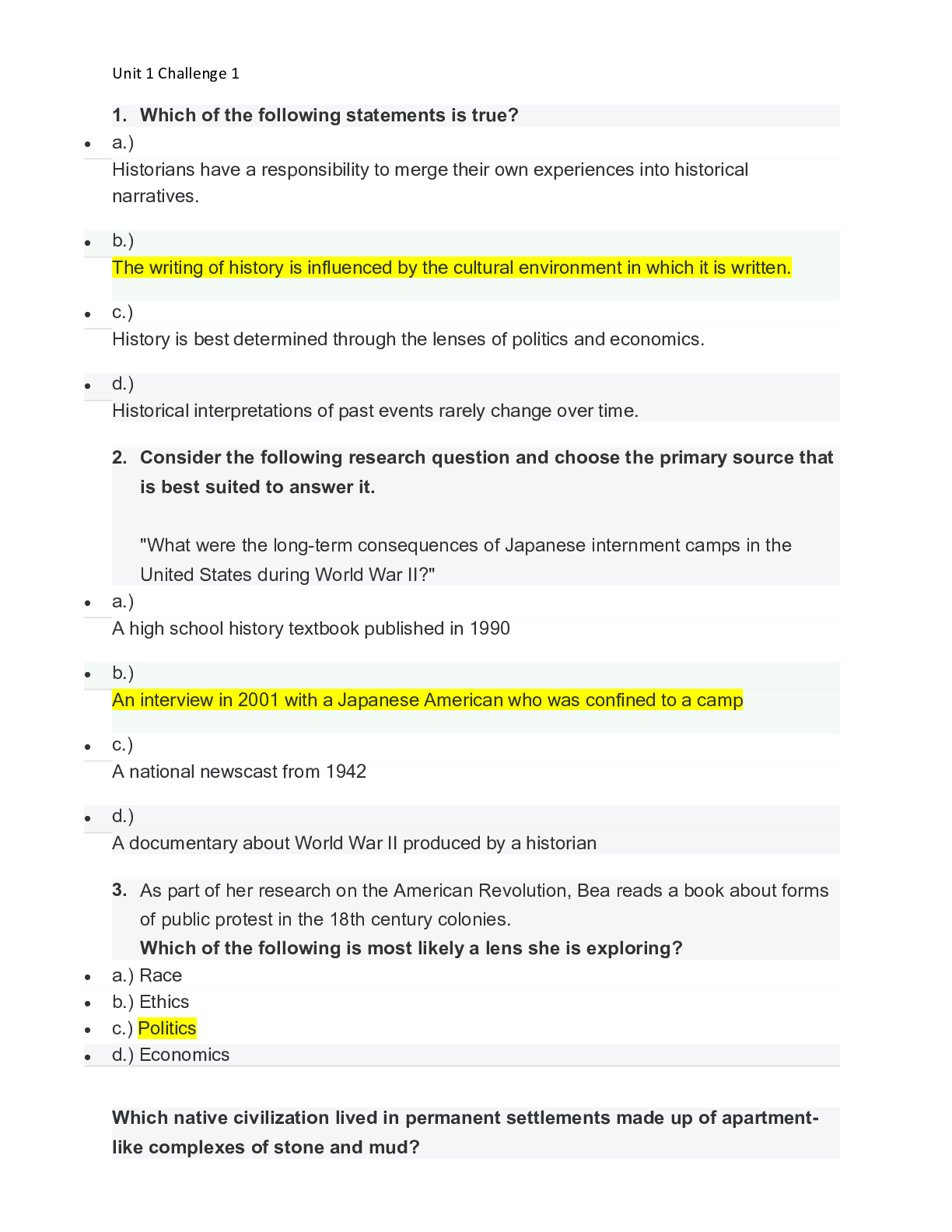
Reviews( 0 )
Document information
Connected school, study & course
About the document
Uploaded On
Mar 10, 2021
Number of pages
56
Written in
Additional information
This document has been written for:
Uploaded
Mar 10, 2021
Downloads
0
Views
109

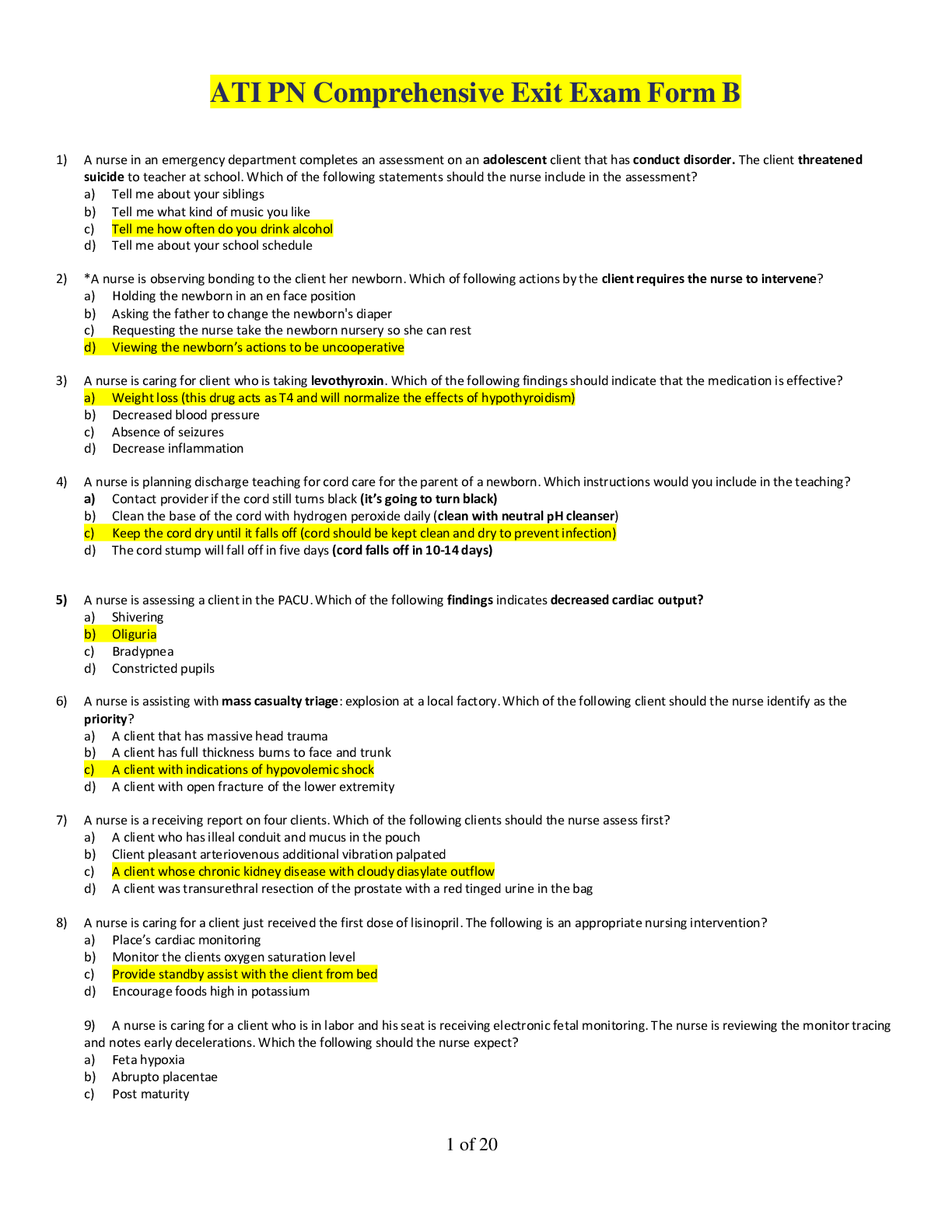
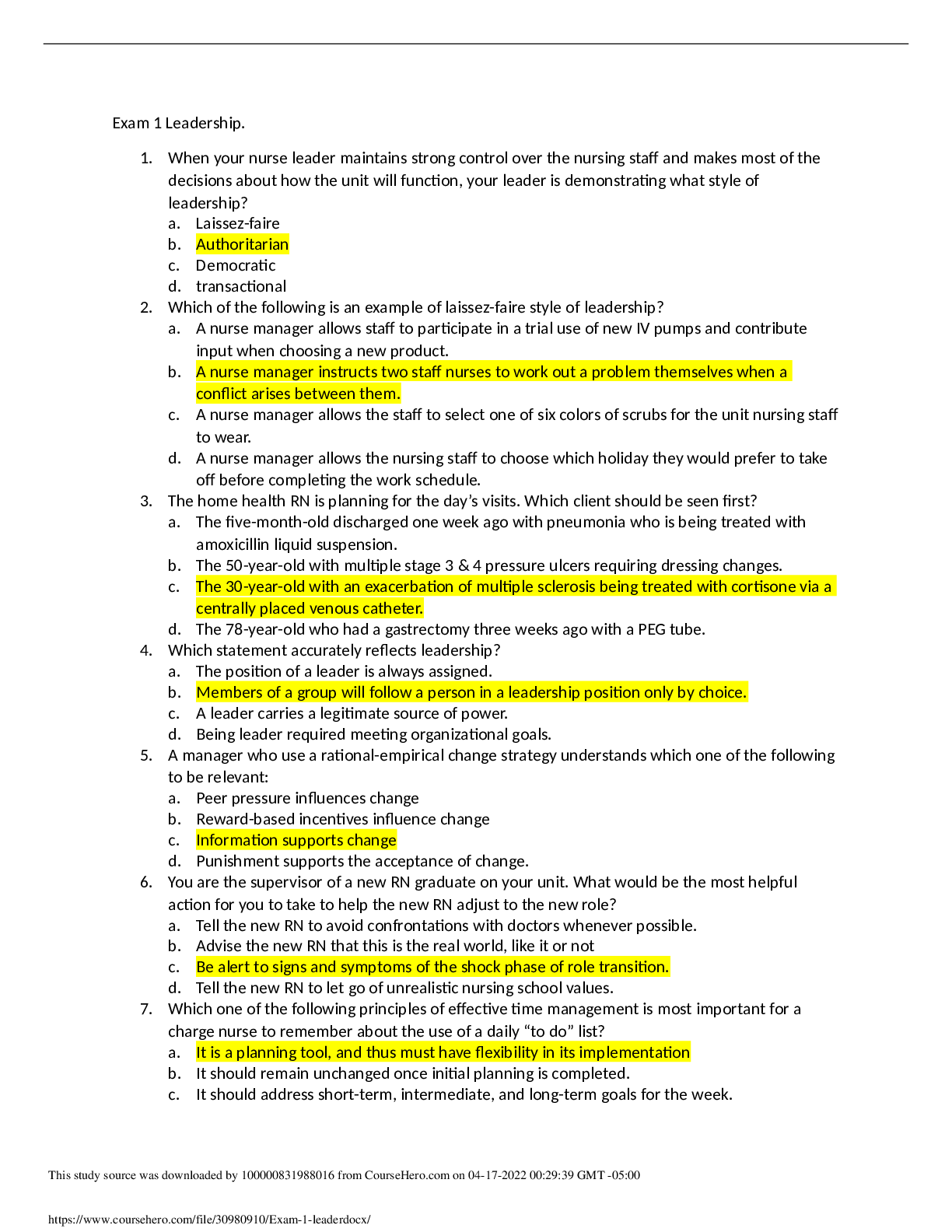
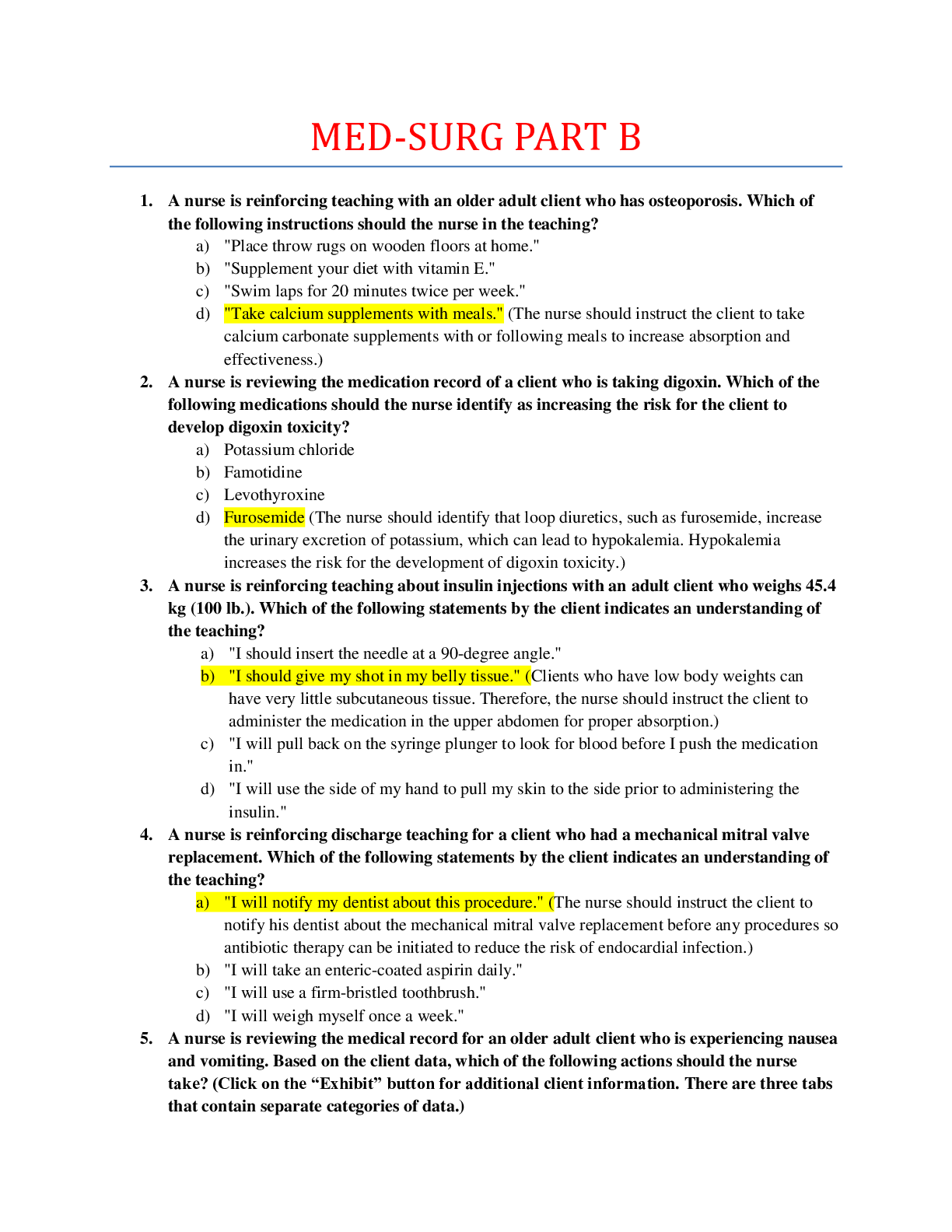
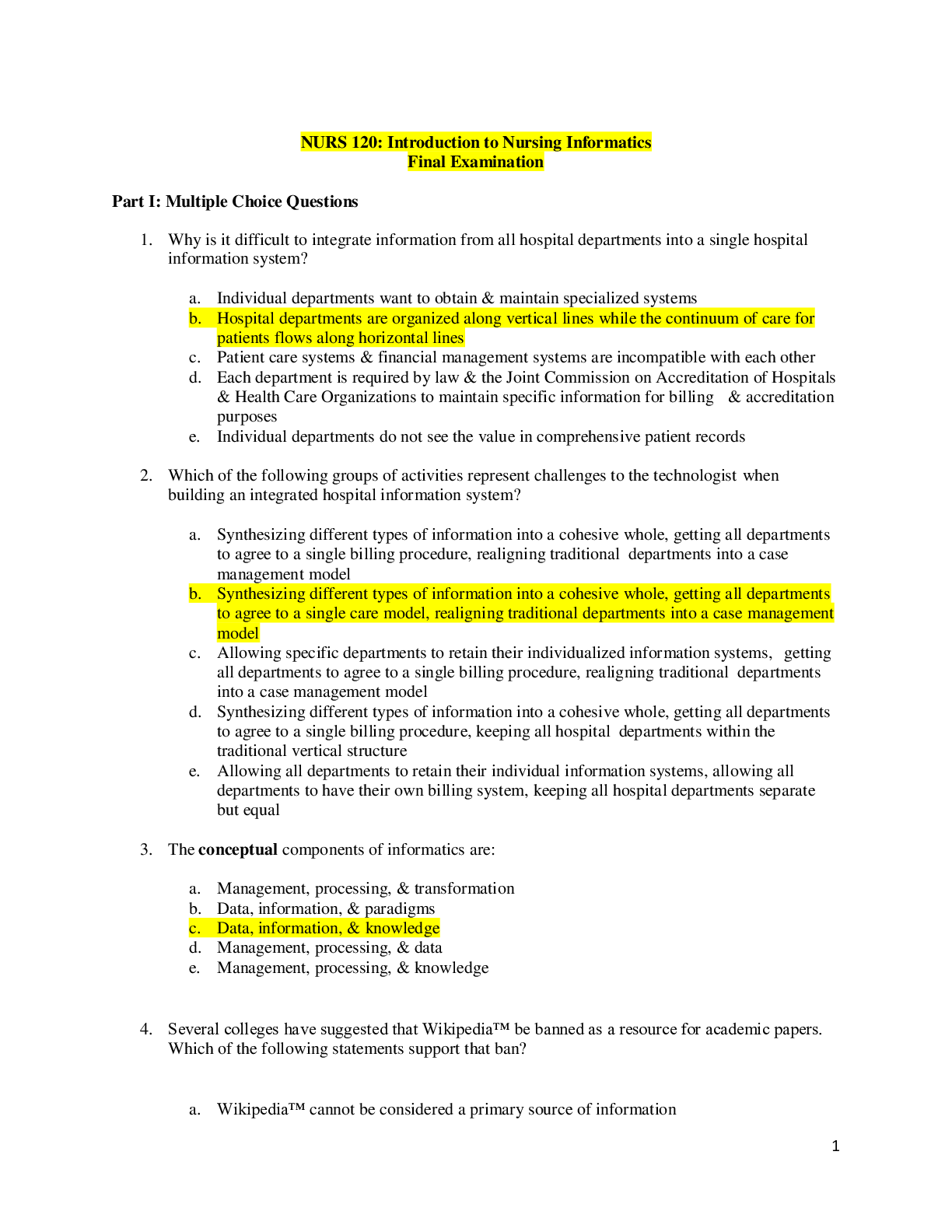
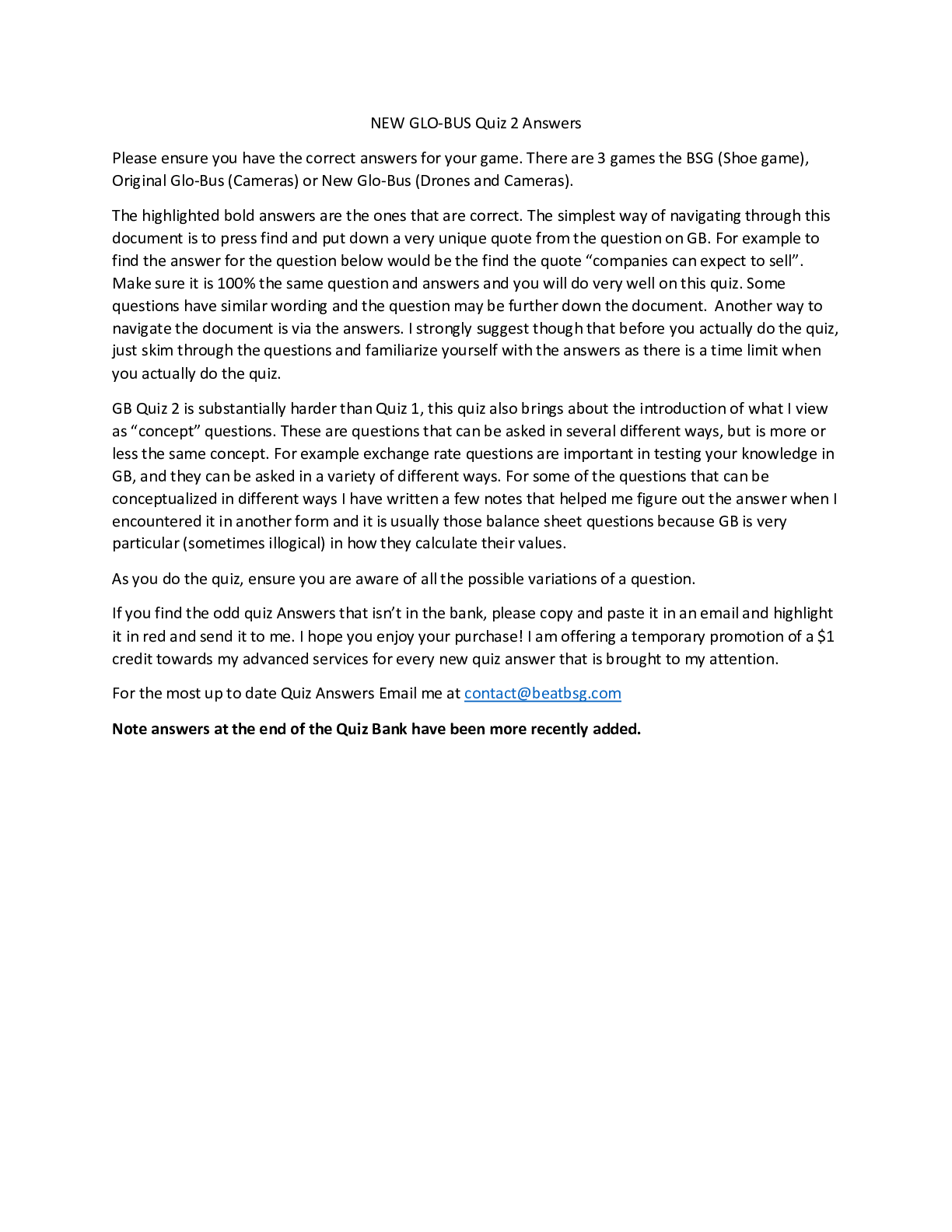
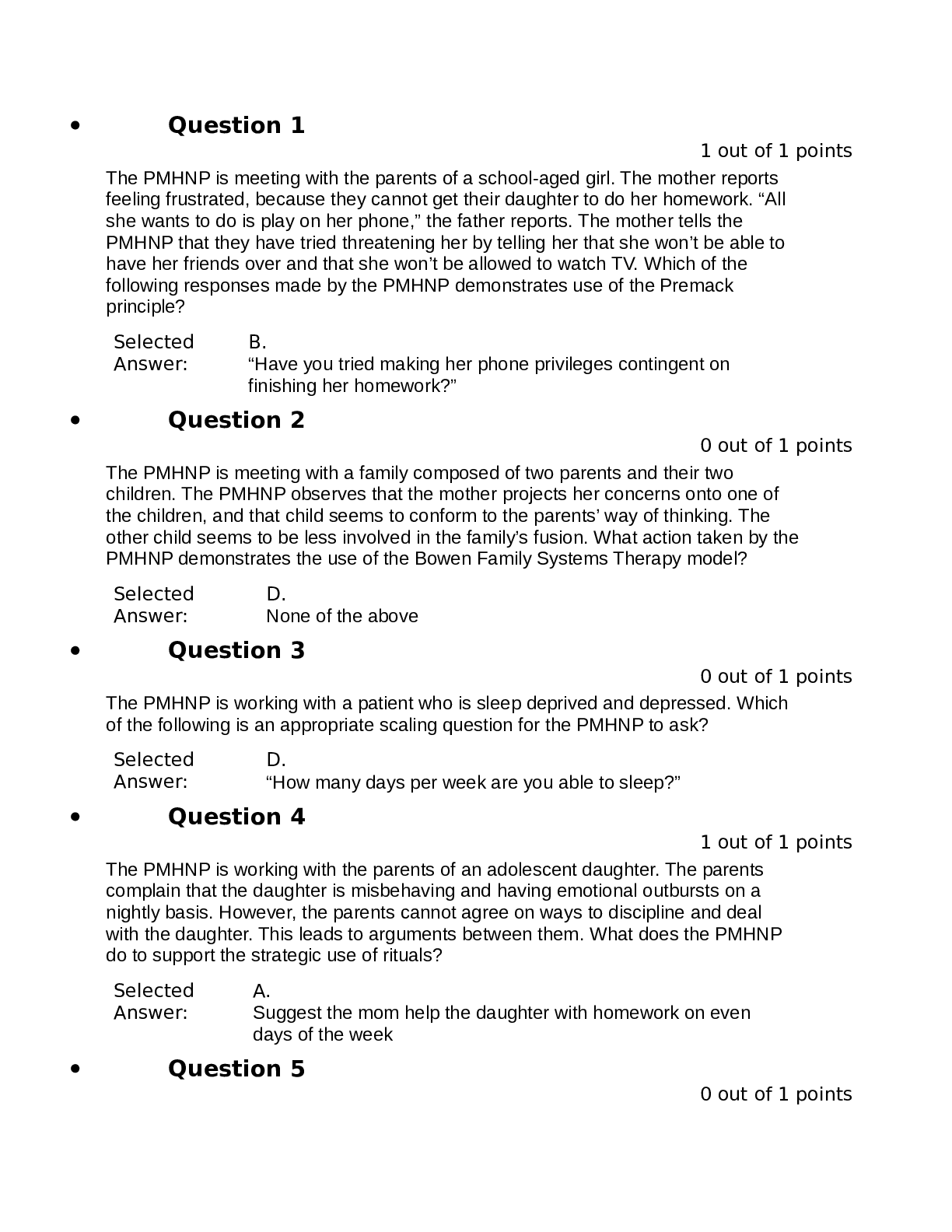
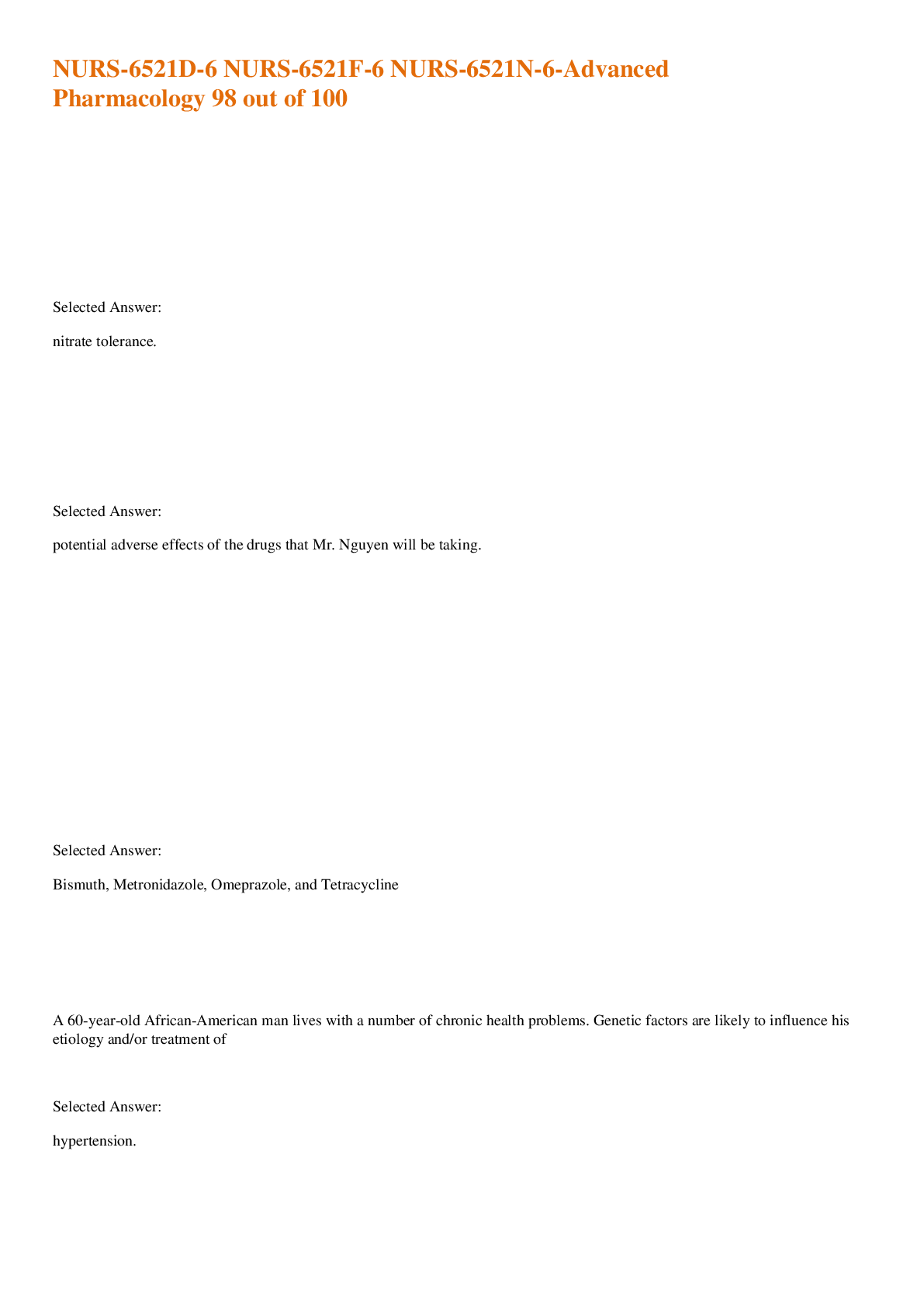
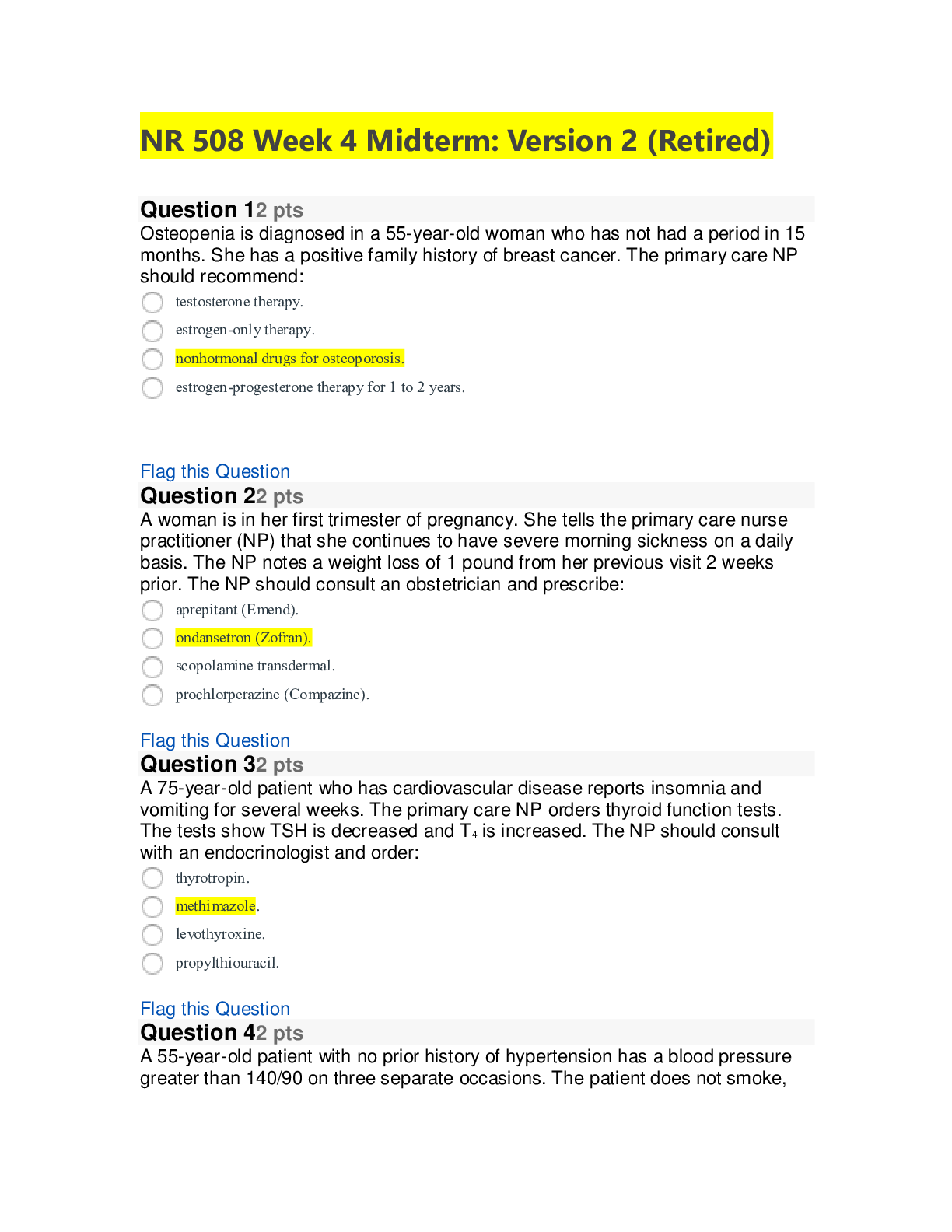
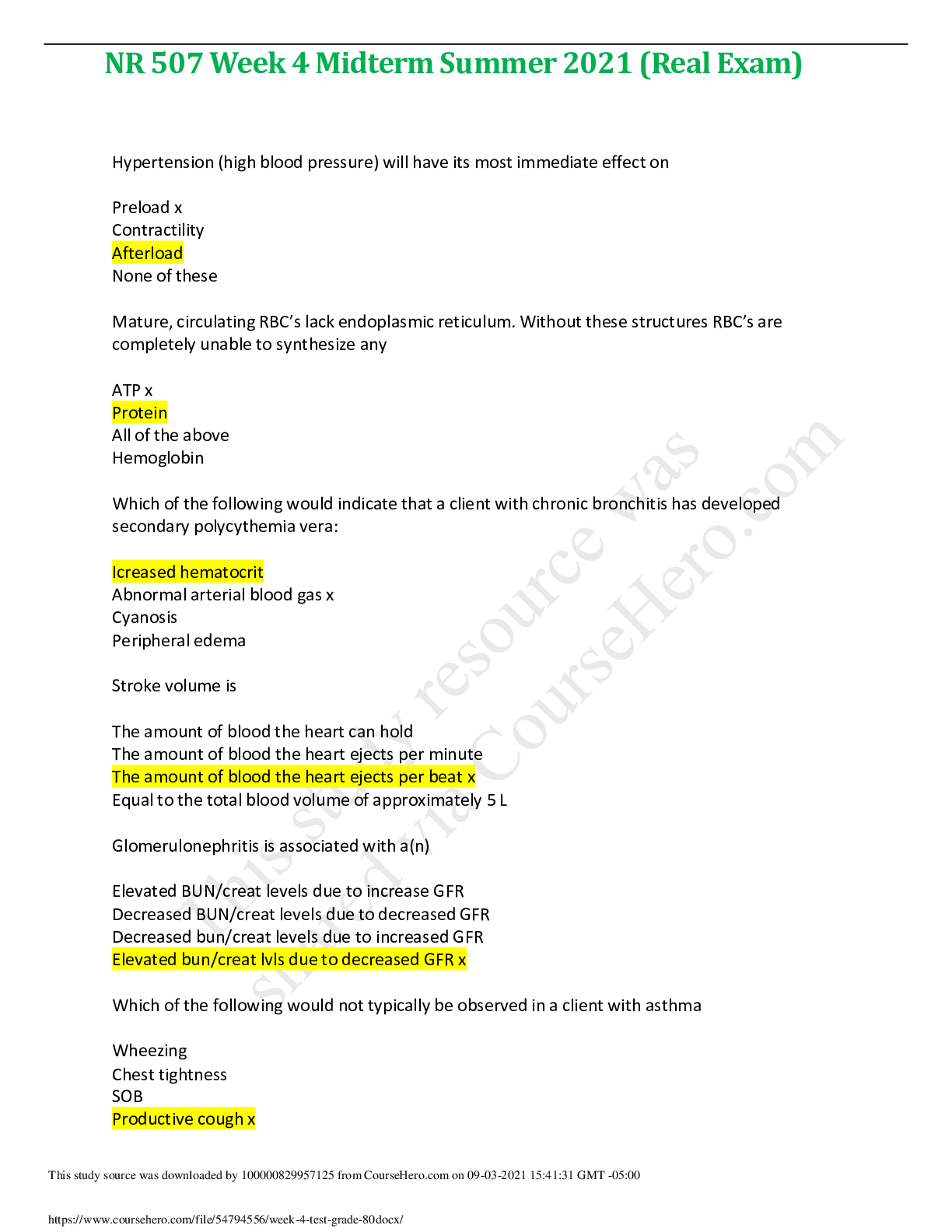

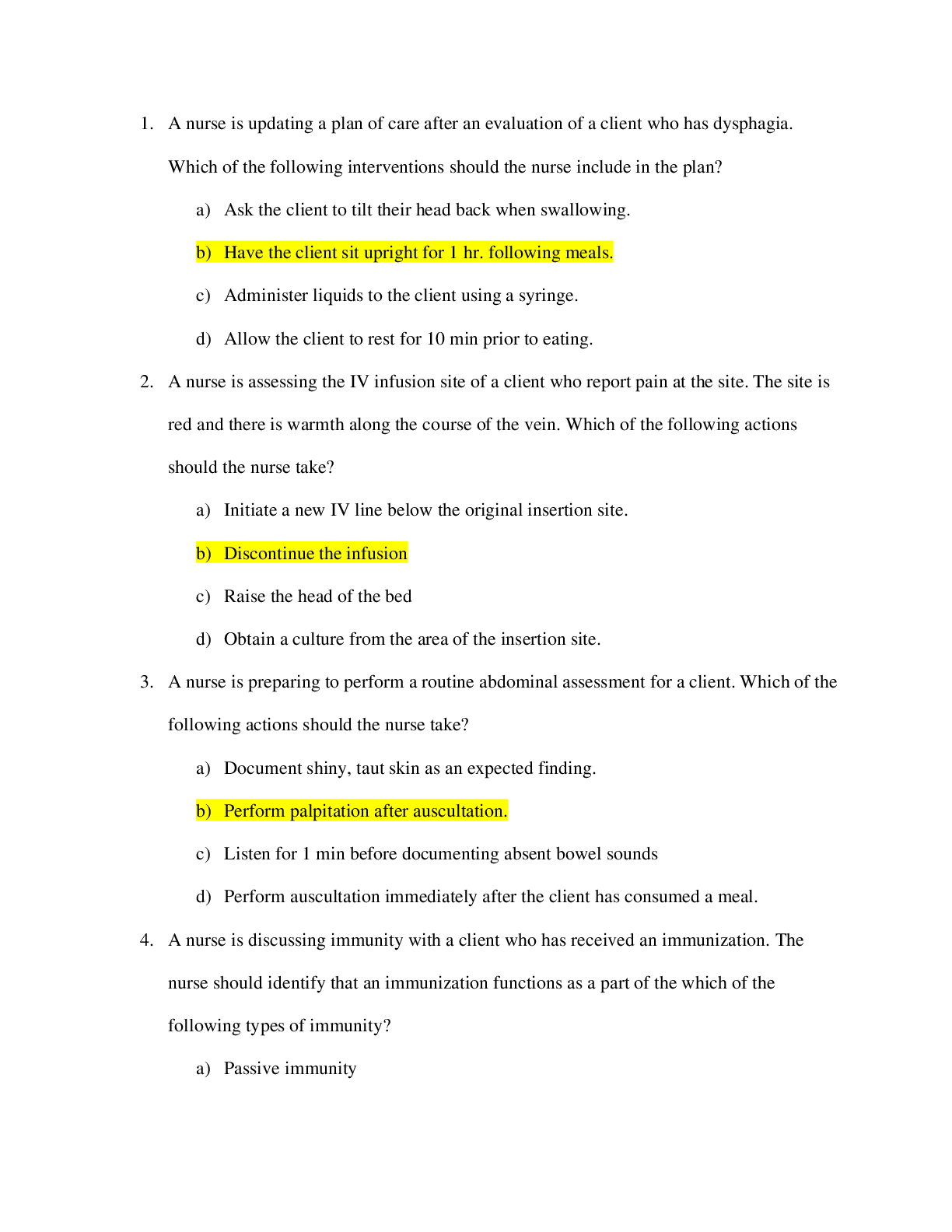
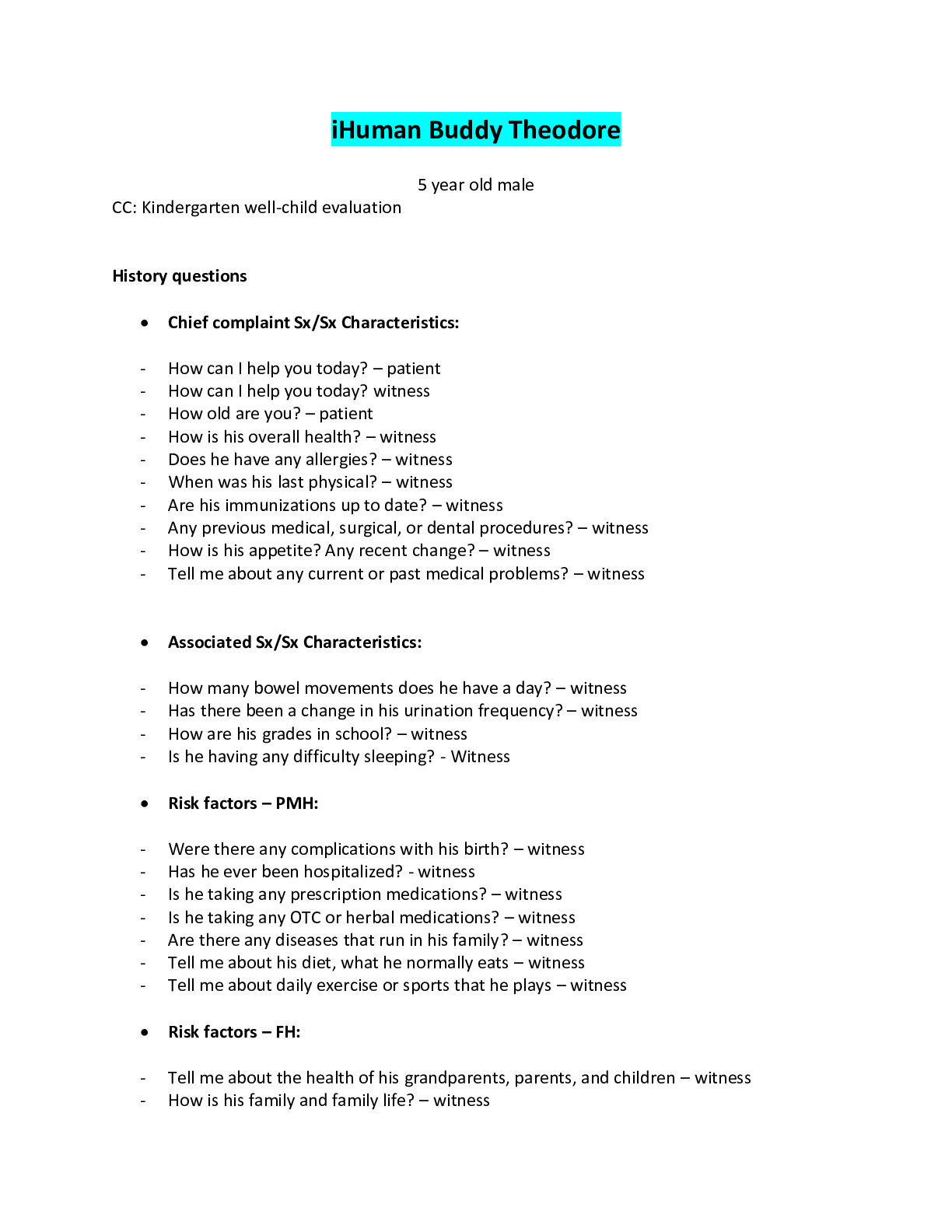
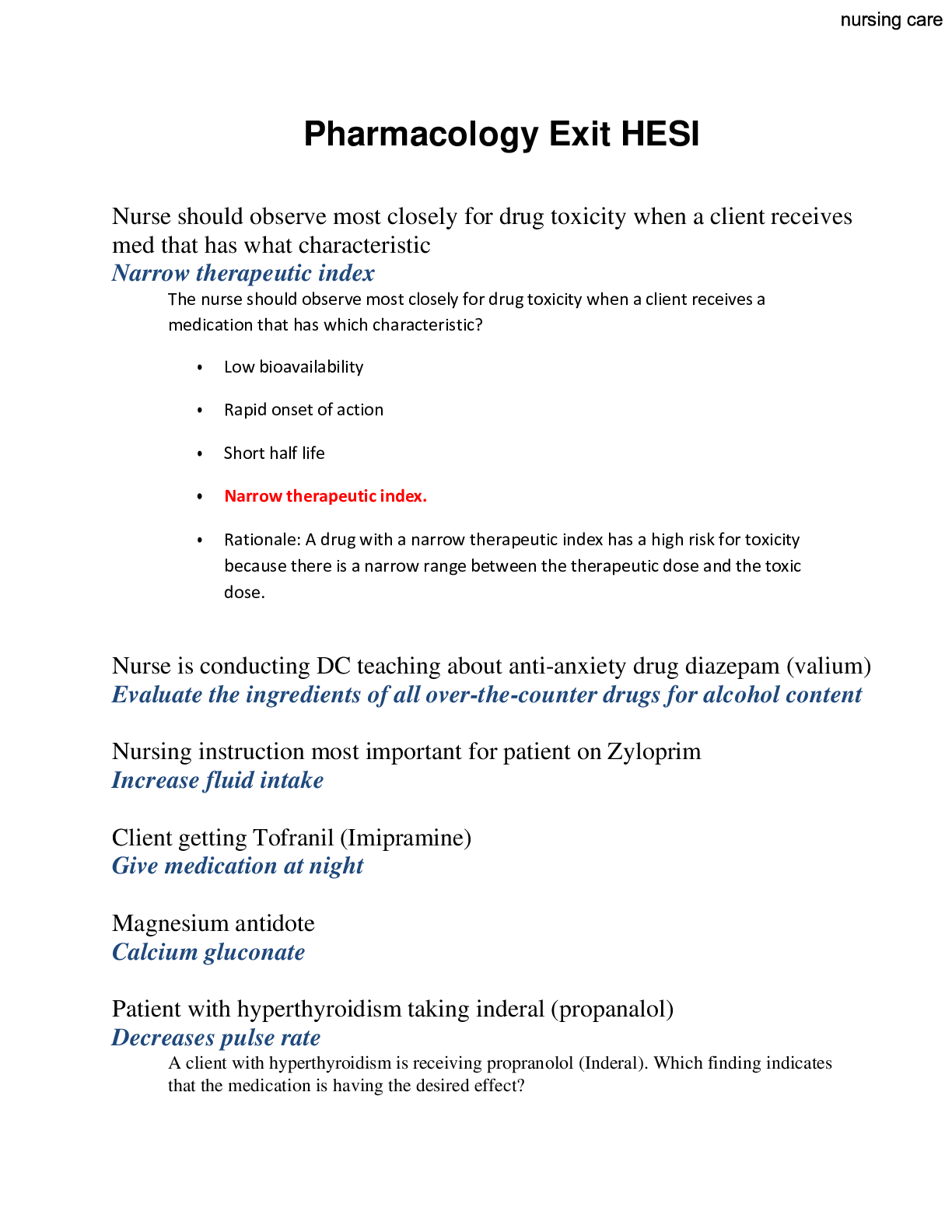
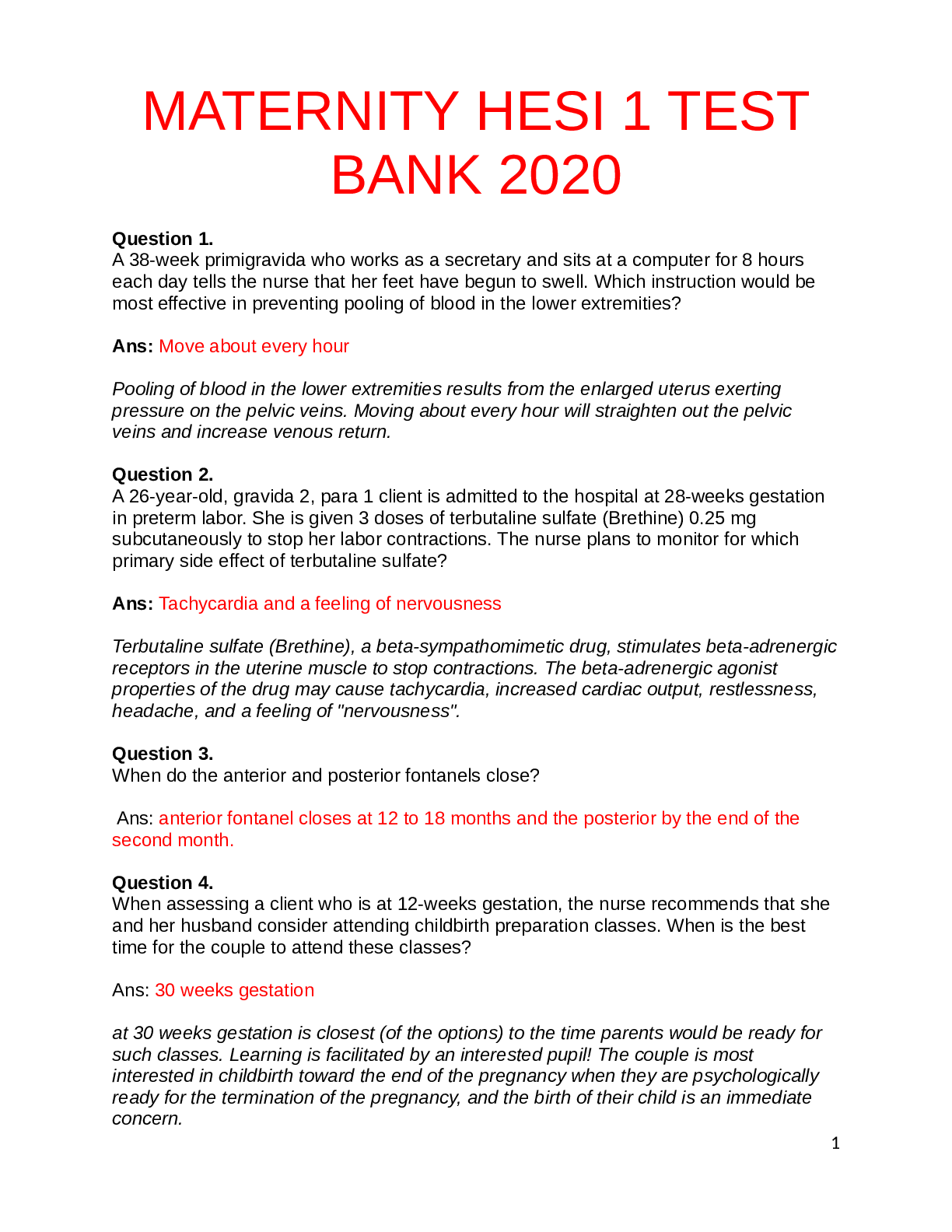
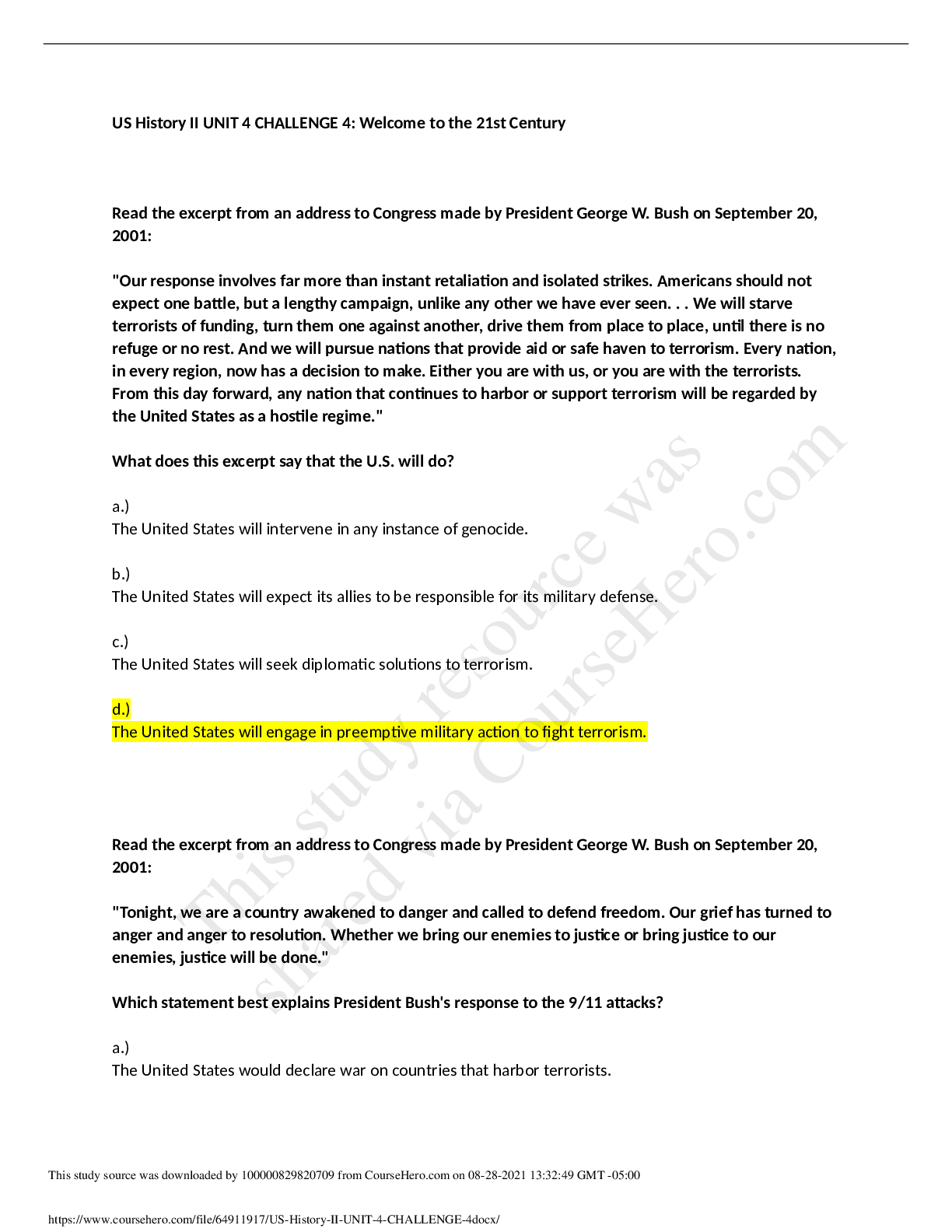
.png)
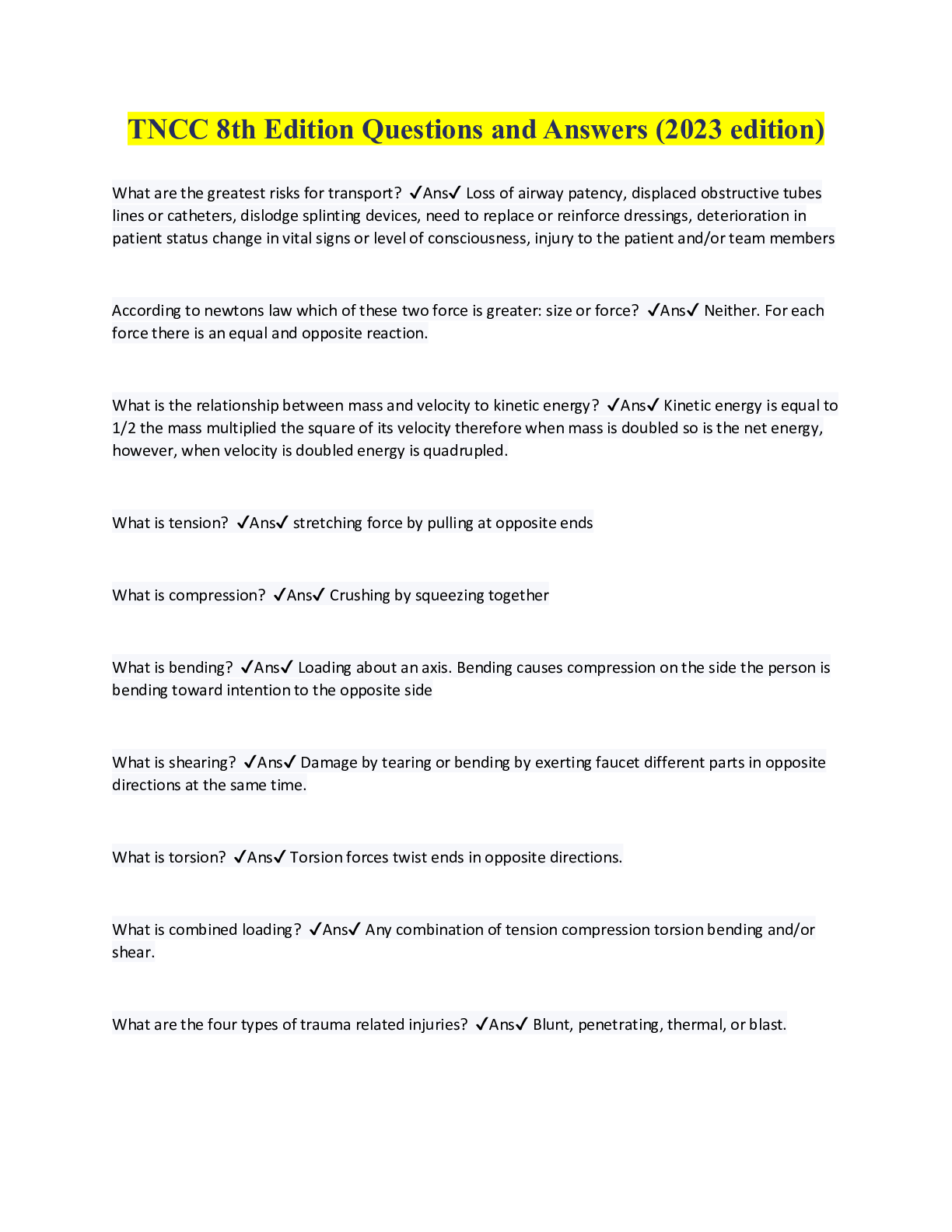

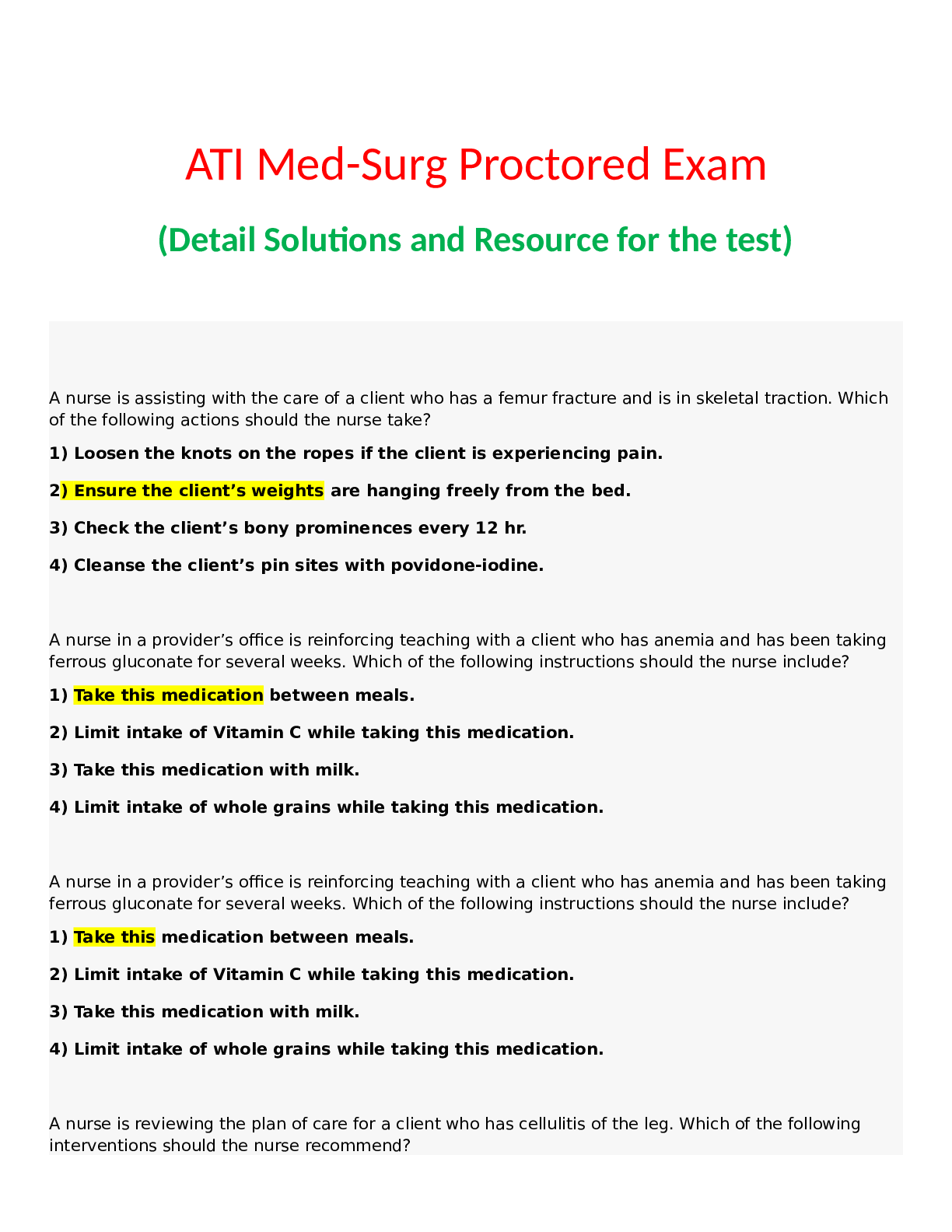
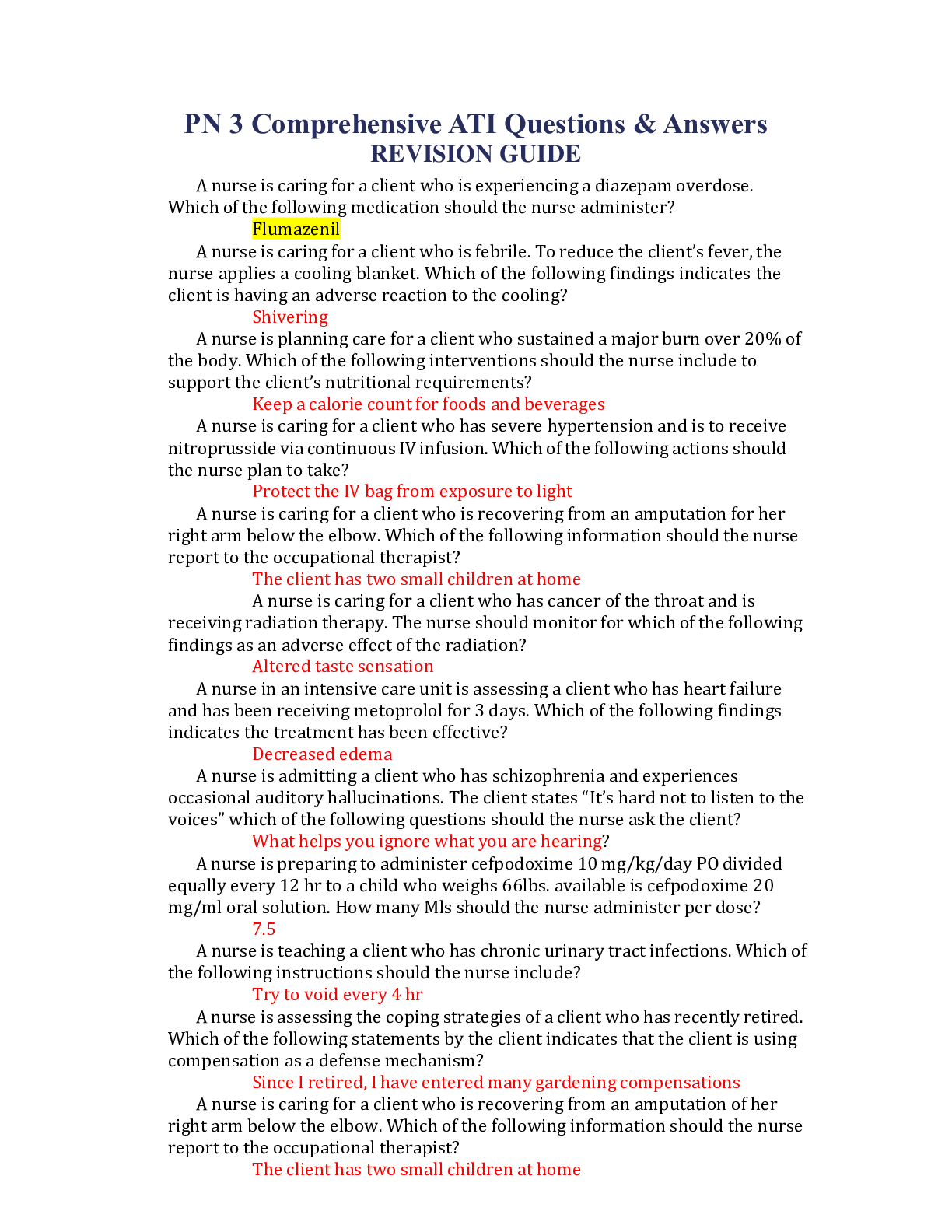
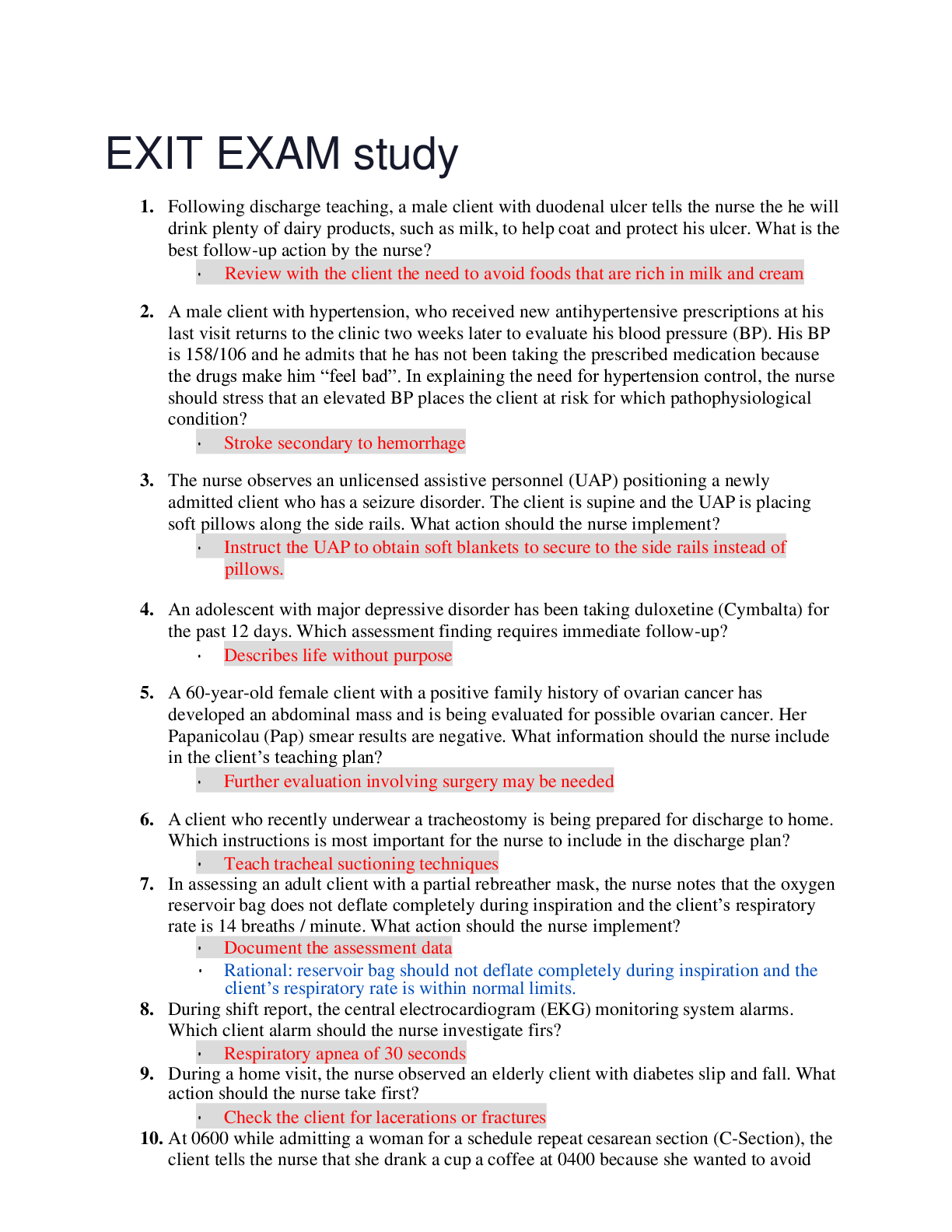
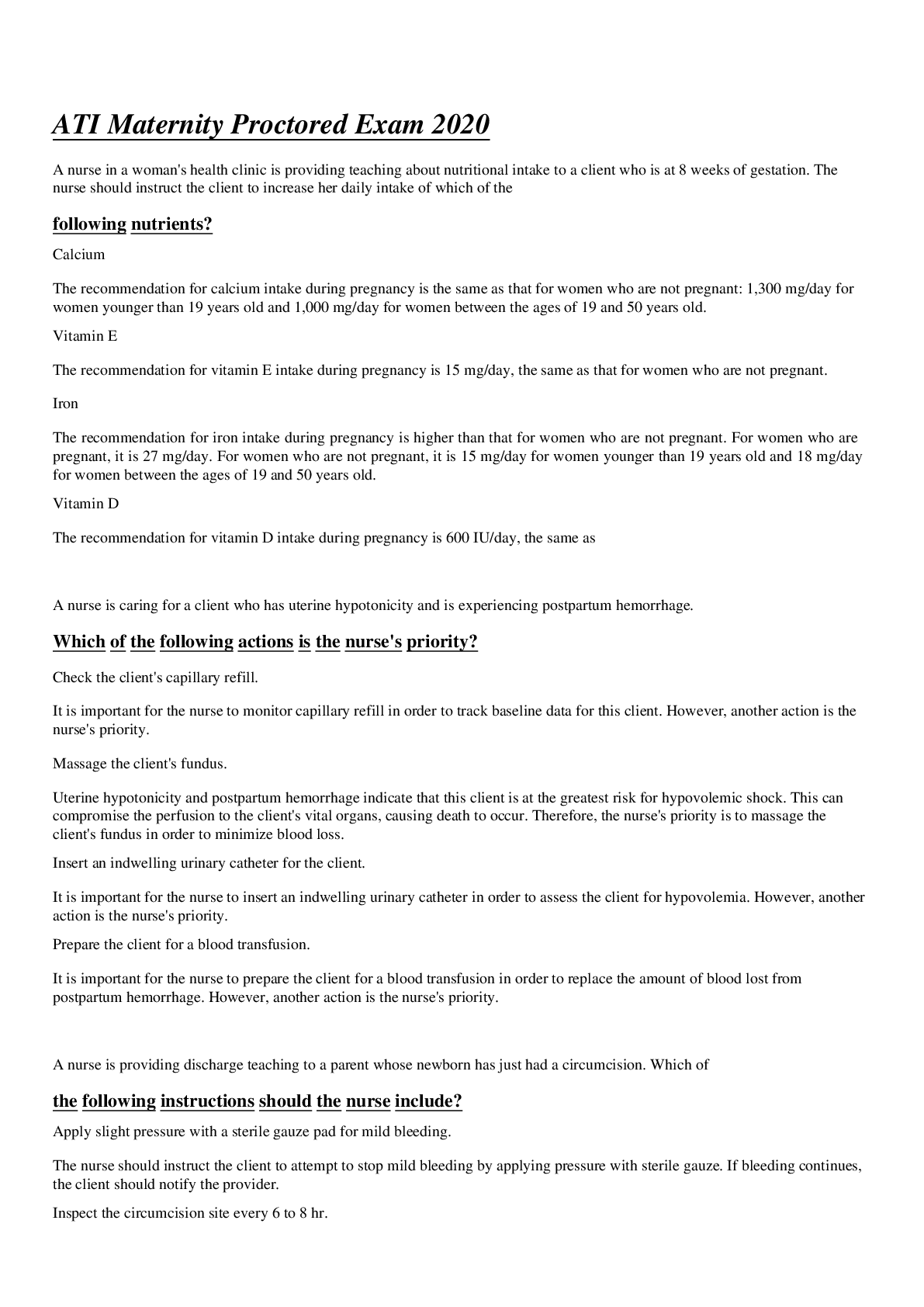
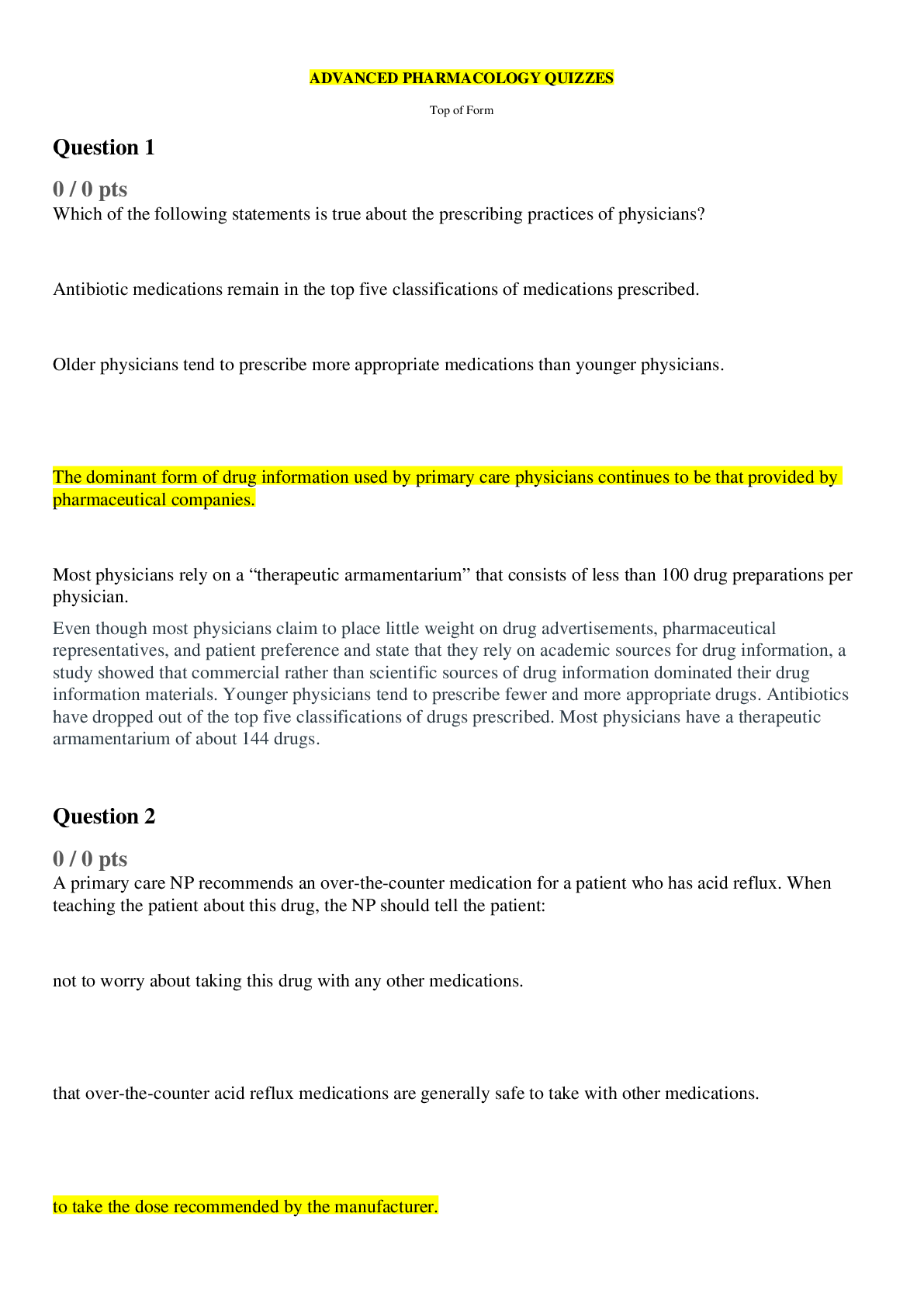
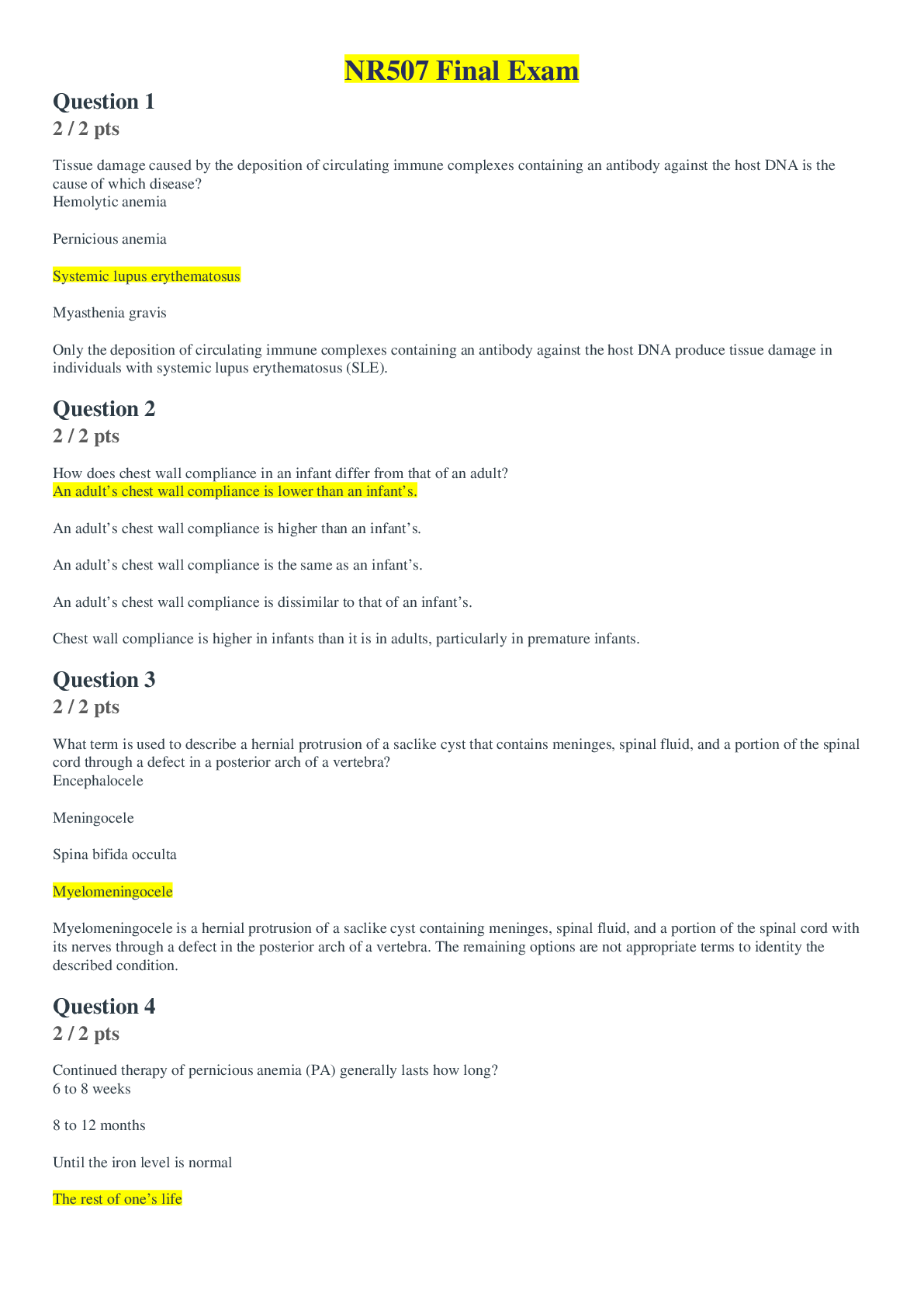
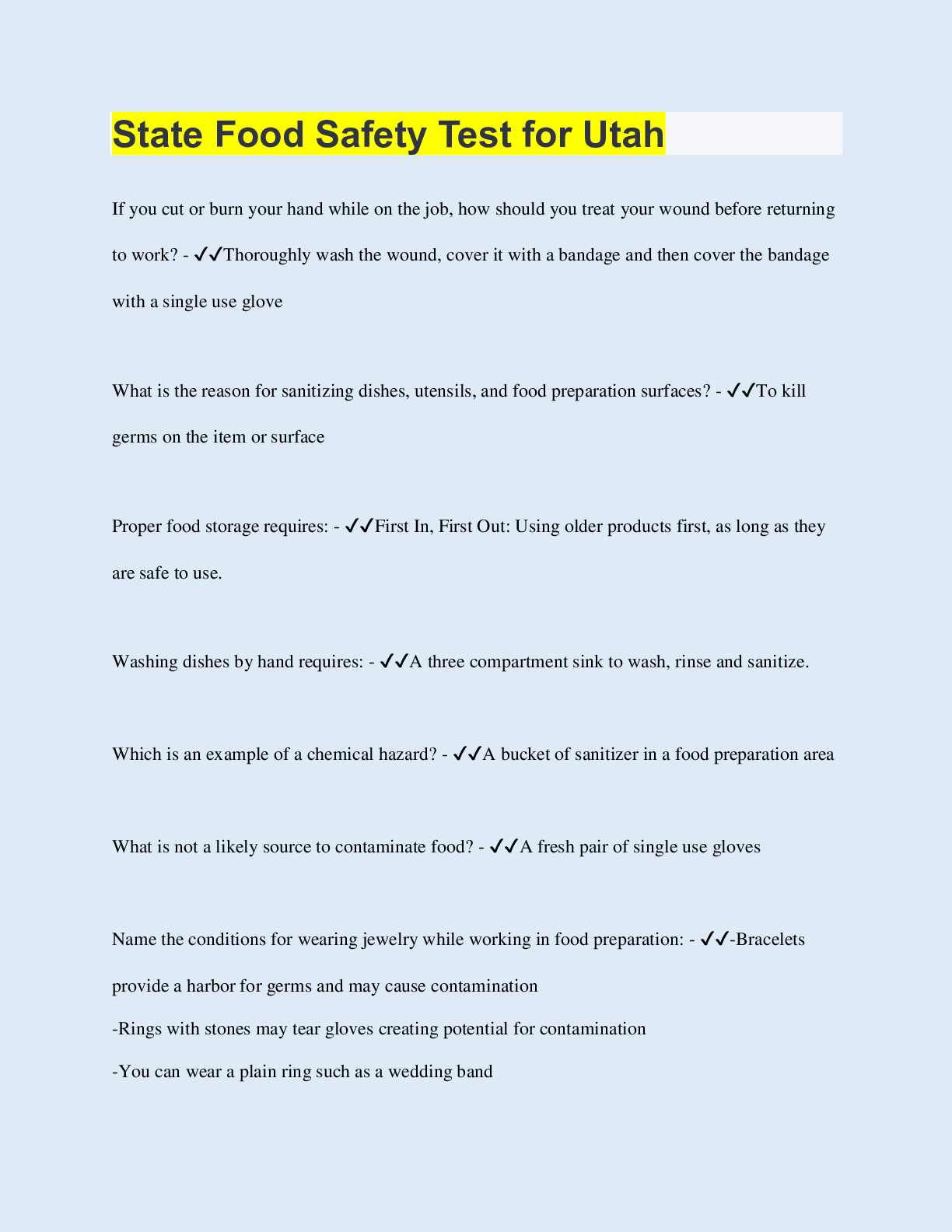
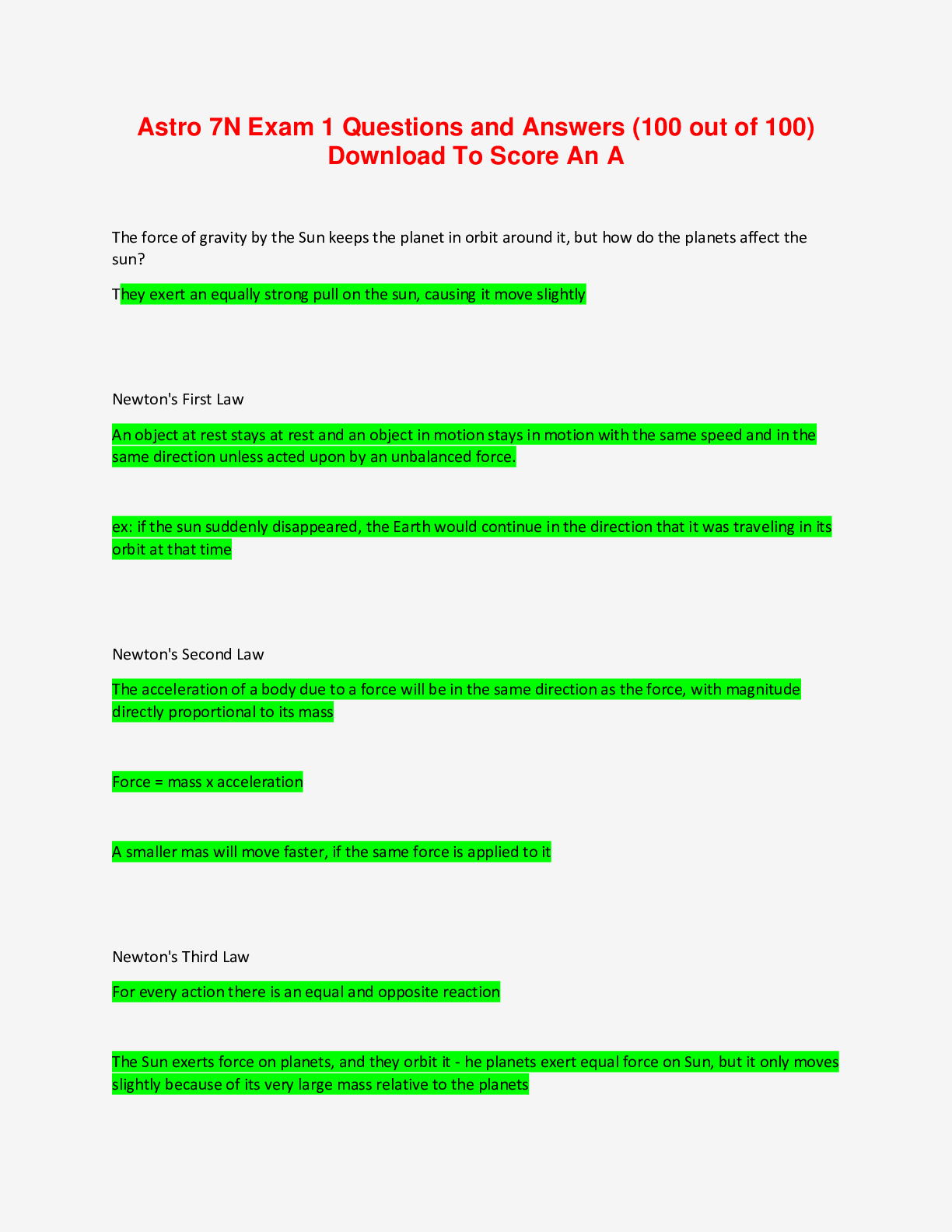
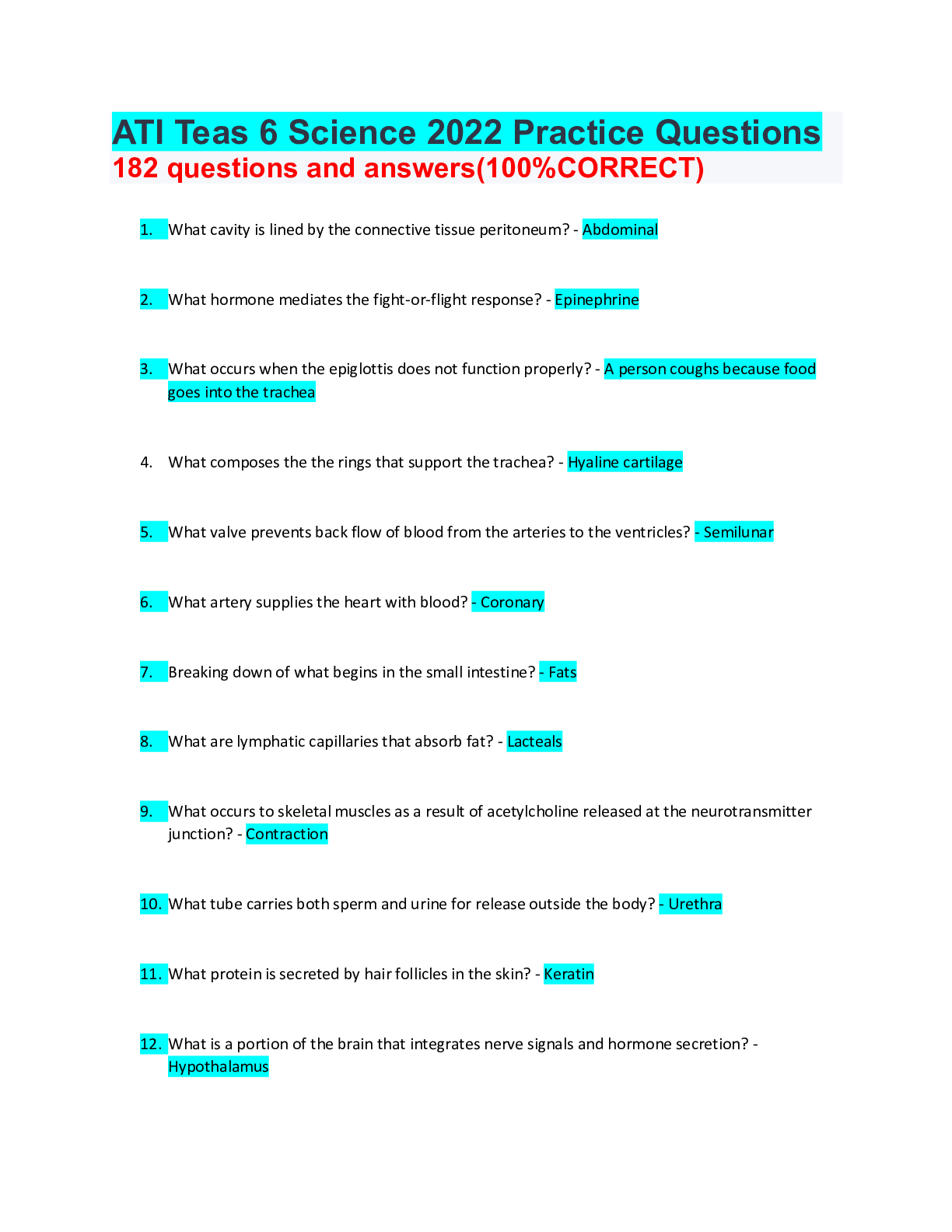
.png)
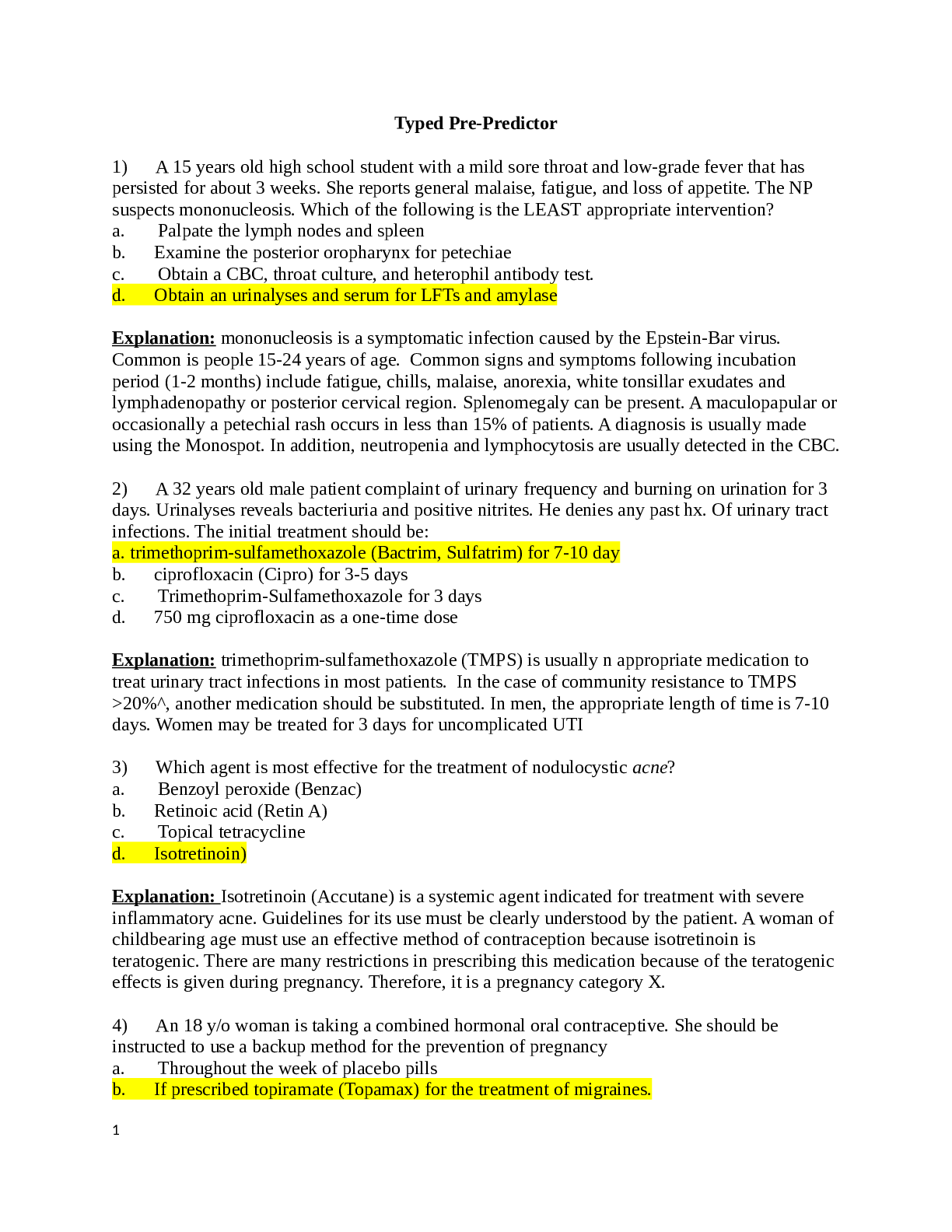
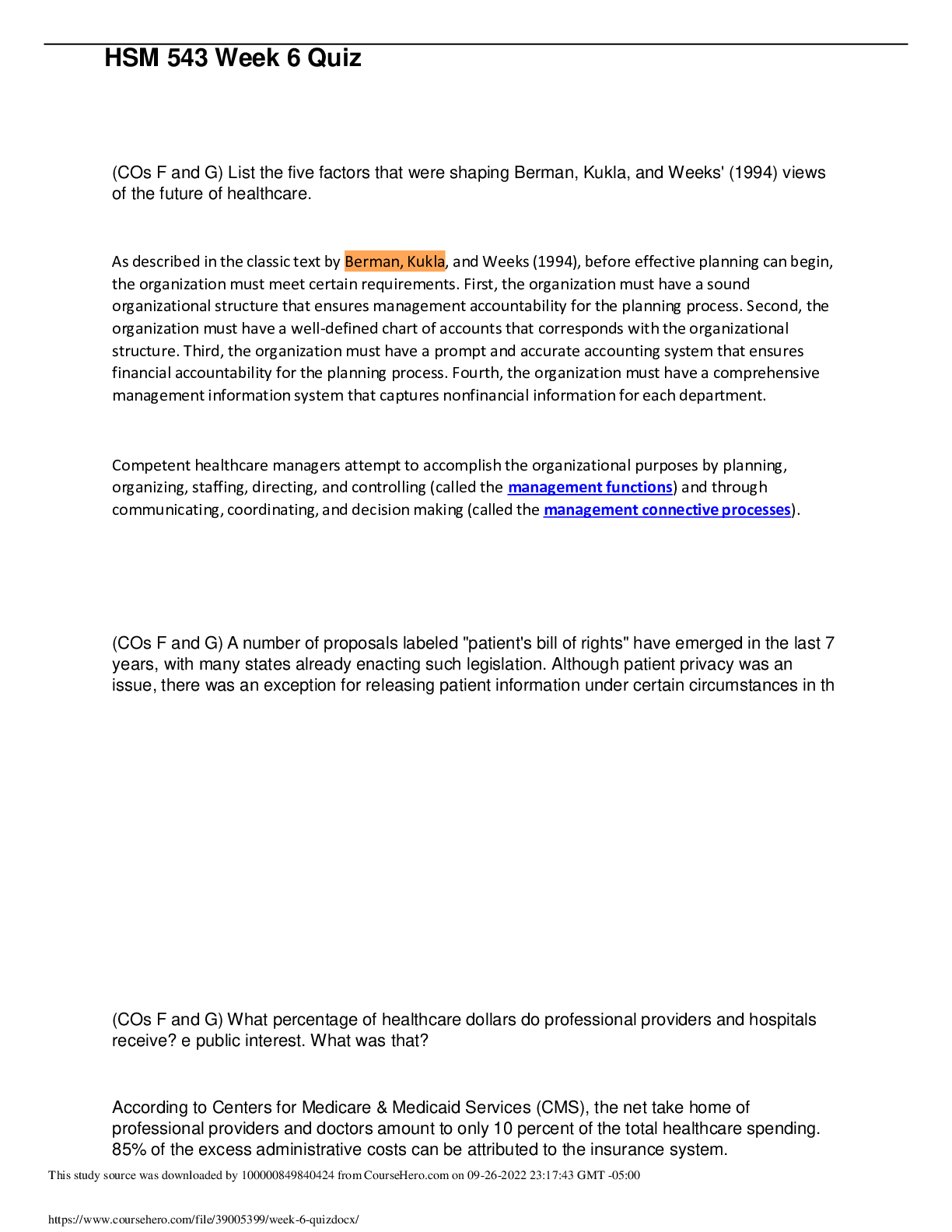
 (1).png)
.png)

